









Sectoral Mission to the UK GROWING GREEN: Boosting Trade and FDI Linkages Towards a Sustainable Future June 14-16, 2023 Gold Sponsors Silver Sponsor Knowledge Partner Communication Partner INVESTMENTS Supported by: Platinum Sponsors
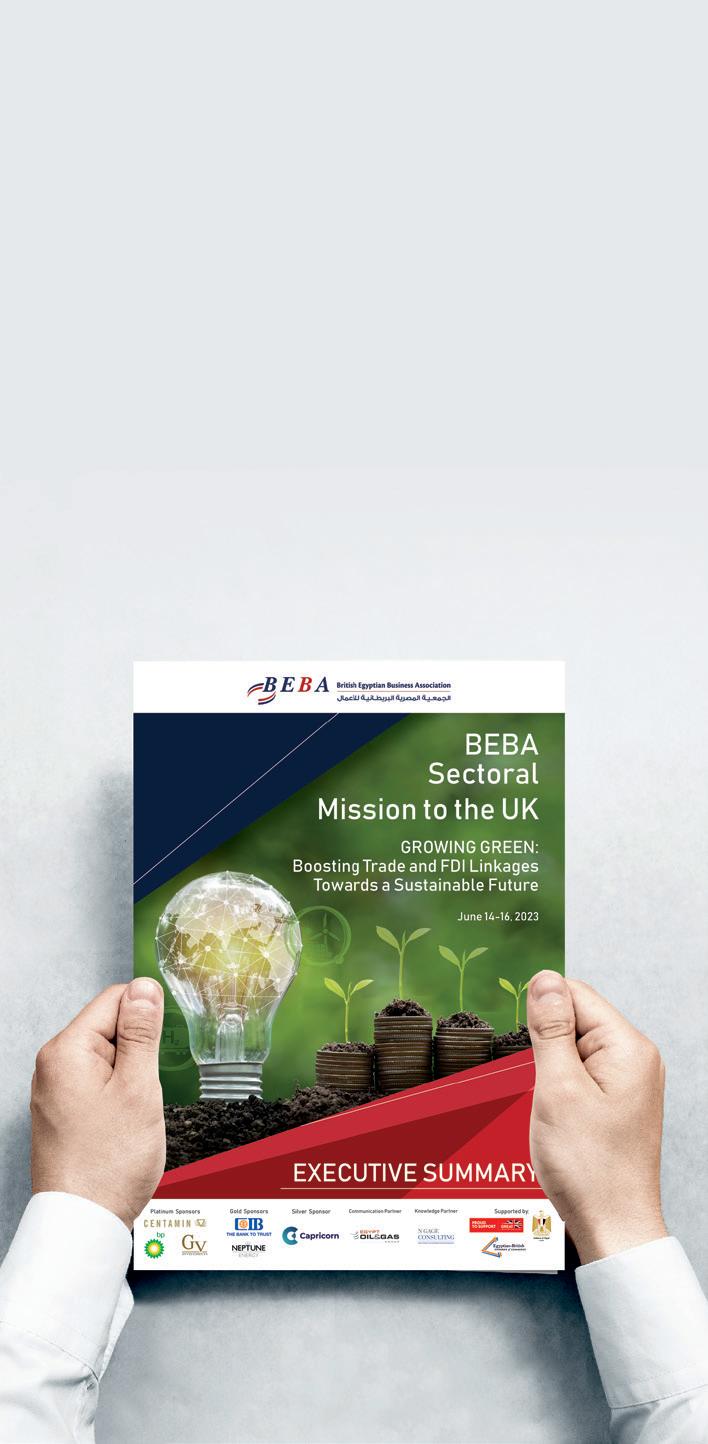




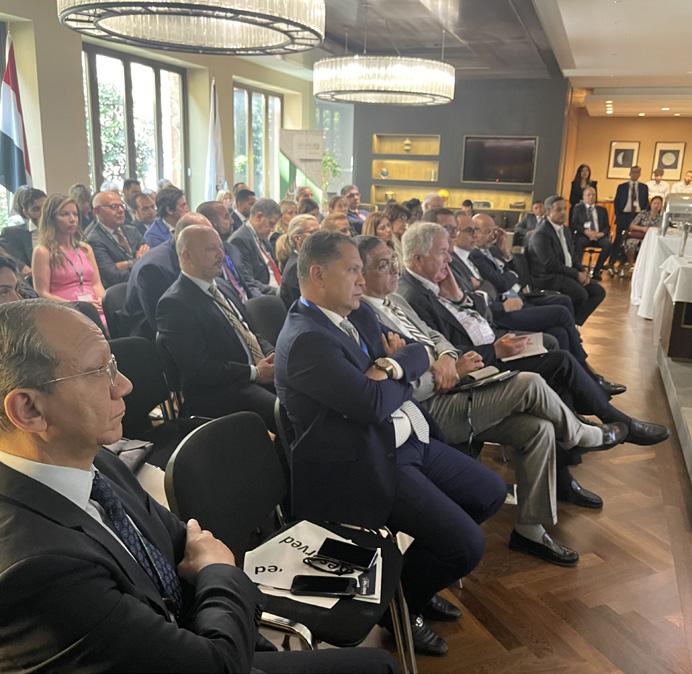


Introduction Wednesday June 14, 2023 Low Carbon Pathways: Towards a Just Energy Transition Plenary Session I: Decarbonization Plenary Session II: Hydrogen Trajectories Investors Roundtable Discussion Networking Business Event Thursday June 15, 2023 Financing the Egyptian Green Economy Mining Roundtable Discussion Investors seminar Networking Reception PUBLISHED BY: WPL CONTRACT PUBLISHING 46 HENEAGE ROAD, GRIMSBY NORTH EAST LINCOLNSHIRE DN32 9ES UNITED KINGDOM TELEPHONE: 01472 359036 GRAPHICS DEPT. STUART TURNBULL - Studio Manager RACHEL RILEY - Designer All rights reserved. No part of the BEBA Executive Summary magazine may be reproduced or stored in a retrieval system or transmitted in any form, electronic, mechanical or photocopying, without prior written permission of the publishers. The publishers do not accept responsibility for views expressed, or statements made, or in those reproduced from any other source. No responsibility is borne by the publishers for any errors made in any advertisement, or for claims made by any advertiser which are incorrect. The publishers cannot be held responsible for any breach of copyright arising from any material supplied. This includes copy, design and/or images. Don’t count the people that you reach, Reach the people who count. David Ogilvy 03 14 Copyright © 2023 All Rights Reserved. CONTENTS 09 16 Friday June 16, 2023 Breakfast Briefing in honour of HE Dr. Mohamed Maait Networking Business Lunch Impressions on BEBA Mission 01 02 04 06 07 10 18 22 14 20 12 16 21 08
Introduction
With the pressing adverse impacts of climate change, the Egyptian Government having held the Presidency of COP27 has been providing an ample focus on the transition towards a green economy.

Releasing the region’s first sovereign green bonds in 2020 which were valued at USD 750 million and then following it with the release of the country’s National Climate Change Strategy 2050 towards achieving climate-resilient economic growth, knowledge production, governance, and adaptive capacity amongst others; Egypt reflects its resolute vision to consolidate the new reality in which development is linked to digital transformation, the optimal exploitation of information technology, the developments of the fourth industrial revolution, and the transition towards green economy. Beyond such efforts, the Egyptian Government is also on its way to releasing its National Green Hydrogen Strategy in cooperation with the European Bank for Reconstruction and Development (EBRD), with the strategy aiming to secure an ambitious 8% of the global hydrogen market.
In light of that and of BEBA’s mission and continuous efforts to promote investment and business opportunities between Egypt and the UK through a variety of tools including coordinating panel discussions and facilitating B2B networking, BEBA held a sectoral mission to the UK held during June 14th16th, 2023, with the overarching theme of the mission being
“Growing Green: Boosting Trade and FDI Linkages Towards a Sustainable Future”. During the three-day sectoral mission, BEBA targeted promoting opportunities and investments in Egypt focused on decarbonization, renewable energy, mining, green financing and bonds.
Behind the Egyptian Government’s plans to increase over the coming three years the private sector share in the national economic activity to reach 65%, up from the current 30%, along with its forward-looking policies towards the green transition, this sectoral mission to the UK aimed to primarily highlight that despite the existence of challenges, there remains a multitude of opportunities for the UK businesses and private sector to catalyze in the Egyptian economy within the coming period.
Having been run for the past 8 years, this sectoral mission to the UK included HE Tarek El Molla, Minister of Petroleum and Mineral Resources, HE Dr. Mohamed Maait, Minister of Finance, Mr. Hossam Heiba, President of the General Authority of Investment and Freezones (GAFI) and Rami Abul Naga, Deputy Governor, Central Bank of Egypt among with 40 prominent business people.
• 01 EXECUTIVE SUMMARY
Wednesday June 14, 2023


Hosted by MHA Baker Tilly
Low Carbon Pathways: Towards a Just Energy Transition
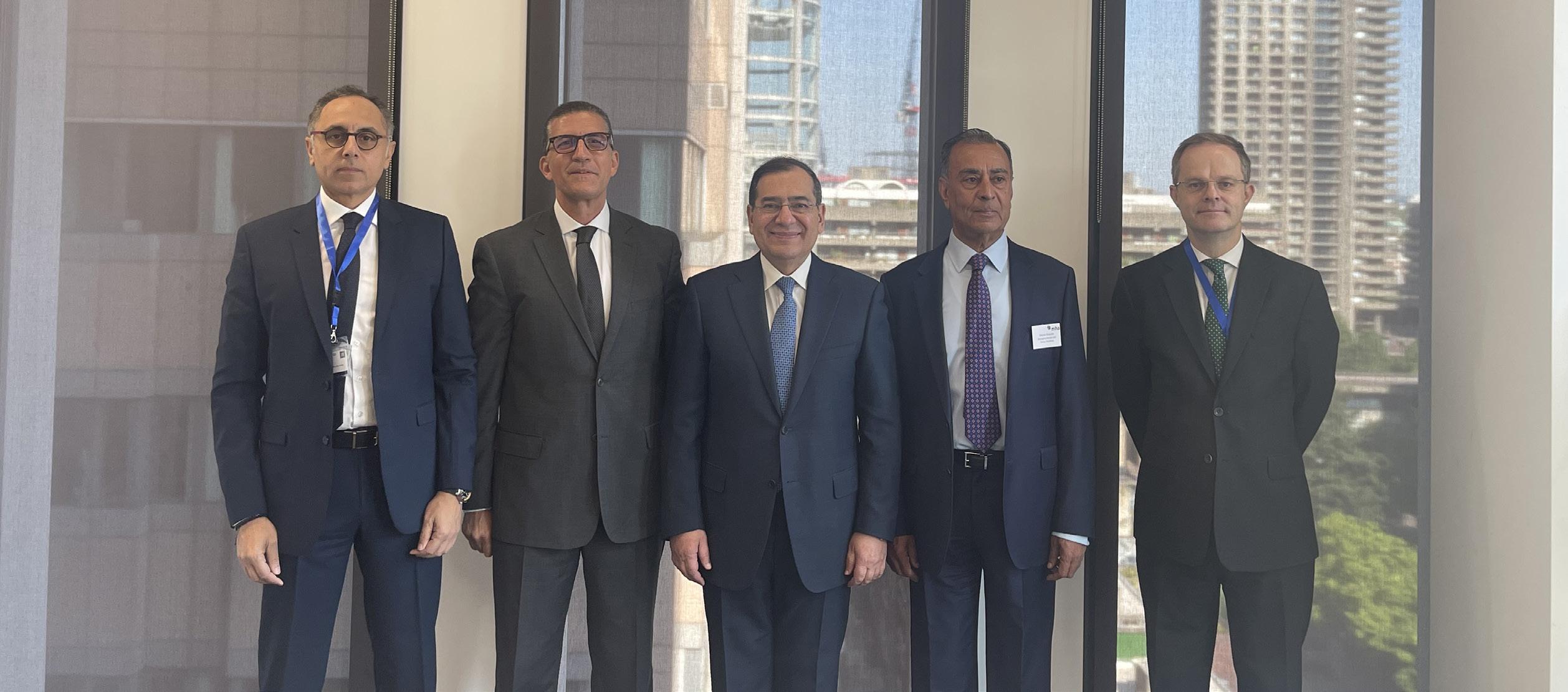
Split into two panels and bringing together public and private top executive speakers and high caliber of British investors; this session focused on the importance of transitioning to a low-carbon economy that secures a more equitable, sustainable future.

02 EXECUTIVE
•
SUMMARY
Hosted at MHA, Baker Tilly, the two plenary sessions explored pathways for Egypt’s transition to a low-carbon economy while ensuring a just and fair energy transition, including discussions on the role of renewable energy, energy efficiency, and carbon capture, utilization, and storage (CCUS) technologies.
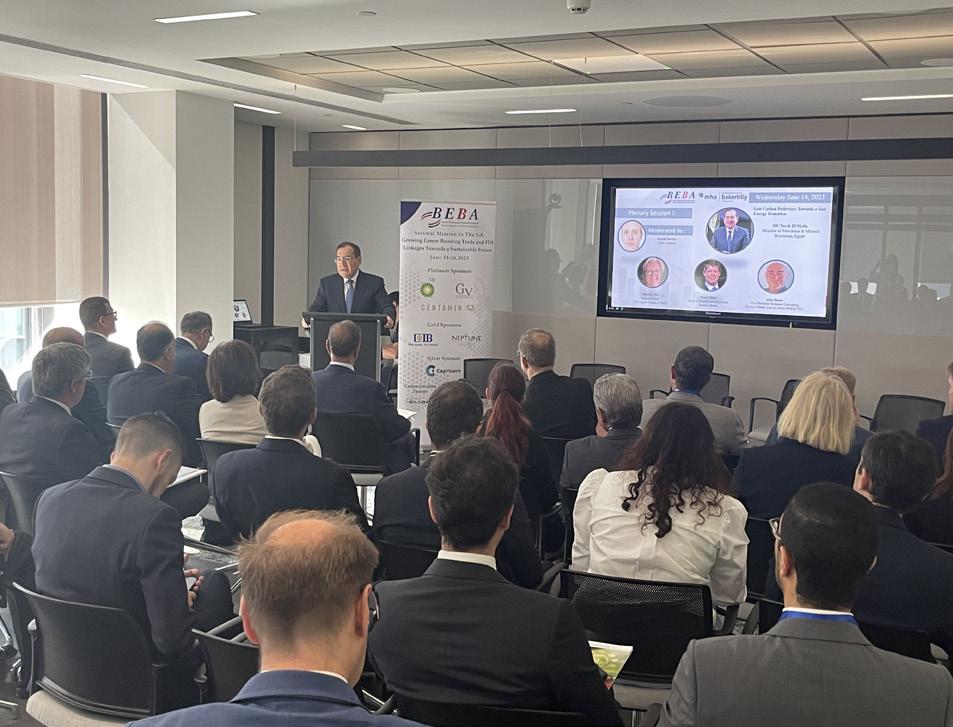

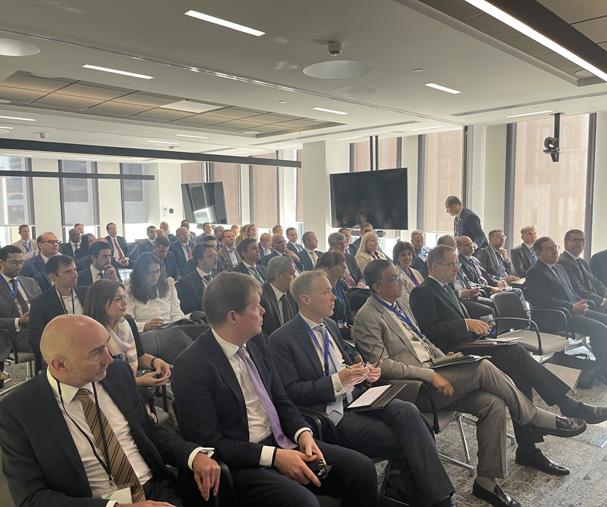

In addition, the sessions discussed the challenges and opportunities associated with decarbonization in Egypt, including the need for further investments, funds, technology transfer, and skills development. With the Egyptian Government being on the lookout to releasing its National Green Hydrogen Strategy, the panels also shed light on the Government’s efforts to expand its green hydrogen production and the undertaken efforts to prioritize the needs and interests of all stakeholders, particularly those who are disproportionately affected by the transition.
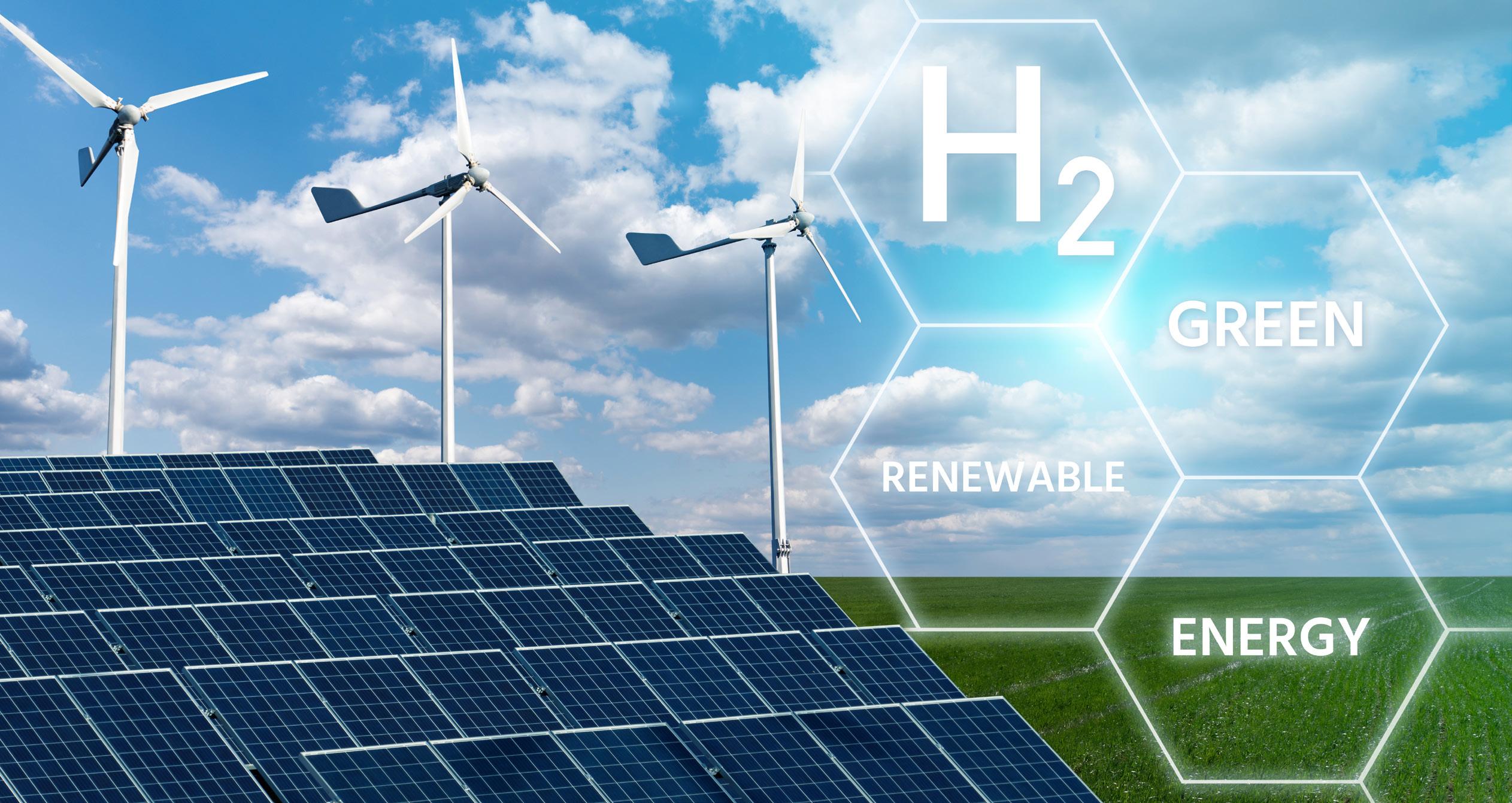
The Egyptian Ambassador to the UK Sherif Kamel, welcomed the attendees; he was followed by the British Ambassador to Egypt Gareth Bayley and BEBA Chairman Khaled Nosseir, who then gave the floor to HE Tarek El Molla, Egyptian Minister of Petroleum and Mineral Resources, to give his keynote speech. The session encouraged an open dialogue among policymakers, industry leaders, and other stakeholders, to provide a deeper understanding on the challenges and opportunities associated with a just energy transition in Egypt.
Egypt’s market potential of 110 million consumers as well as its strategic location and abundant amount of energy and gas resources, coupled with the UK being the 1st economy in the world to commit to net zero by 2050, makes it only natural to have the partnership between both countries further prosper with the private sector being a key partner in the consolidation of such endeavors.

• 03 EXECUTIVE SUMMARY
Plenary Session I:
Decarbonization



The first panel under this session focused on decarbonization, discussing the ongoing and future decarbonization efforts of Egypt’s oil and gas sector, besides exploring the potential opportunities for learning and collaboration with the UK as a leading country in this regard.


04 EXECUTIVE SUMMARY •
The Minister remarked that Egypt was honored with hosting COP27, adding that the efforts undertaken by the Egyptian state include its persistence towards the inclusion of the oil companies during COP27 discussions behind the role they play in the green transition in introducing ways to reduce carbon emissions with new fluids companies and their invaluable experiences that can be utilized when using renewable energy technologies, in addition to the Ministry of Petroleum’s work with professionals to identify the areas where decarbonization efforts are further needed and the way forward to accelerating such transition through the development of a roadmap. Furthermore, during COP27, Egypt launched an Oil and Gas Methane Roadmap framework with core elements of a comprehensive methane reduction approach and is expected to complete a specific Oil and Gas Methane Roadmap for the country this year.
With the pressing implications of climate change and the need to rely on low carbon energy resources, oil reliance is expected to remain in place as the main source of energy in the world time till the green transition can be fully undertaken. Accordingly, the Minister reiterated that oil and gas products with less emissions will particularly aid in this transition phase and in order to expedite such transition, both the governmental and private sectors are required to integrate into the global discussion and collaborate their expertise, technology and resources to develop long-term mitigation and adaption strategies that limit the impact of climate change on the region.
To reach the ultimate goal of utilizing low carbon energy resources, Egypt aims to engage with companies providing innovative technologies to tackle such goal, besides seeking concessionary funds where the private sector gets to act as a catalyst to grow this industry and help different international ACAs to develop new technologies. On the financing front, UK Export Finance (UKEF), the United Kingdom’s export credit agency, remarked that they work on supporting projects in Egypt and across Africa that have transformed local infrastructure and supported livelihoods, where in 2021, UKEF provided a £1.7 billion guarantee to support the construction of the Cairo Monorail, one of the largest amounts of financing provided for an overseas infrastructure project in UKEF’s history. Tasked with redirecting funds to green projects in accordance to the Paris Agreement, UKEF has special terms such as applying up to 22 years of repayment for certain projects such as CCS, hydrogen, and solar projects.
Defined as low carbon fuels, the use of electric power and natural gas ─ a green transitional fuel ─ were amongst the list of achievements accomplished by the Egyptian state, where Minister Molla elaborated that Egypt has utilized and maximized the use of natural gas by turning its 40% natural gas contribution to the energy mix reached 20 years ago to record 65% now, behind the experienced growth in consumption, and the evolving economy. Egypt has also achieved a great stride in connecting more households to natural gas, whereby 14 mn households are now connected compared to the 6.5 mn households connected 20 years ago, largely due to natural gas being environmentally friendly and easy to use. The Government is also taking steps in increasing natural gas reliance across multiple national initiatives, namely with the inclusion of villages in the Decent Life Initiative and the introduction of the Car Replacement Initiative where the country now has around 900 stations providing natural gas. Such transition has not only aided the country in reducing fuel subsidies, CNG consumption and oil imports; but also in expanding the production and exportation of fertilizers and leveraging the petrochemical industries. With a great potential to produce green hydrogen particularly in the fertilizers business and in producing ammonia, Egypt has a multitude of presented opportunities that can be seized by the private sector whether across blending hydrogen with natural gas or increasing its carbon capture process.

Moderated by Mark Davies, CEO, Capterio, the session featured the following panelists:
• HE Tarek El Molla, Minister of Petroleum and Mineral Resources, Egypt
• Paul Gibbs, Global Head of Business Development, Bechtel
• Michèle Dée, Regional Head, UK Export Finance (UKEF)
• Alan Beere, Vice President Technical Consulting, Europe, Middle East and Africa WOOD Plc

• EXECUTIVE SUMMARY 05
Plenary Session II:
Hydrogen Trajectories
The second panel under the “Low Carbon Pathways: Towards a Just Energy Transition” session aimed to explore the role of low carbon hydrogen in Egypt and the UK, in addition to pinpointing the key enablers that are set to accelerate the development of the emerging low carbon hydrogen economies in both countries. During his statement, HE Minister of Petroleum and Mineral Resources Tarek El Molla shed light on Egypt’s favorable characteristics that make it ideal to having a prosperous hydrogen production, especially behind its strategic geographic location, great specialized infrastructure capabilities, and ample skilled labor. Egypt is currently working on updating its energy strategy in order to include the utilization of green hydrogen, where the country targets having renewable energy make up 42% of the energy mix by 2030, instead of the previously set date of 2035. With the strategy currently being under review and expected to be launched within weeks, Egypt is embarking on realizing such goals by developing a package of incentives for investors in order to develop the hydrogen sector supported by the country’s specialized infrastructure from the transmission, transportation and storage perspective to the existing trained labour.
Currently, Egypt is holding hydrogen pilot projects specially with how new the technology is; nevertheless, the country is adopting the global best practices on this front with the Ministry of Petroleum identifying its interest for green hydrogen by signing a number of agreements that shall develop the sector’s potential. In addition, Egypt’s Government is also working with international partners with the aim of making green hydrogen economically viable for the off-taker and encouraging investments into this sector.
The panel discussion noted that a number of aspects are important to take note off when embarking on this new technology, namely ensuring that the entire supply chain is included within the conversion in order to to bring the cost down, kickstarting the process primarily through setting a regulatory environment and moving forward from there provided, and securing the offtake agreements so that in the future the projects are investable. In
addition, the panelists pointed out that the associated costs need to be looked at the green molecular level, essentially by primarily ensuring that what is produced within the country is consumed within the country, with the export model being adopted at a later stage. With a clear competitive advantage in its production of green ammonia, Egypt has plenty of investment opportunities to develop its pipelines specially with its plans to produce and export green hydrogen, in addition to other investment opportunities presented with the Government looking to produce SAF in two locations behind the new mandate entailing that 20% of jet fuels need to come from this type of fuel. Furthermore, the panelist all agreed that the price of renewables, precisely green hydrogen, is set to decrease in around 15 years behind the scaling up of the supply chain and the advancements undertaken across R&D.
Moderated by EBRD’s Managing Director of the Southern & Eastern Mediterranean Heike Harmgart, the session featured the following panelists:
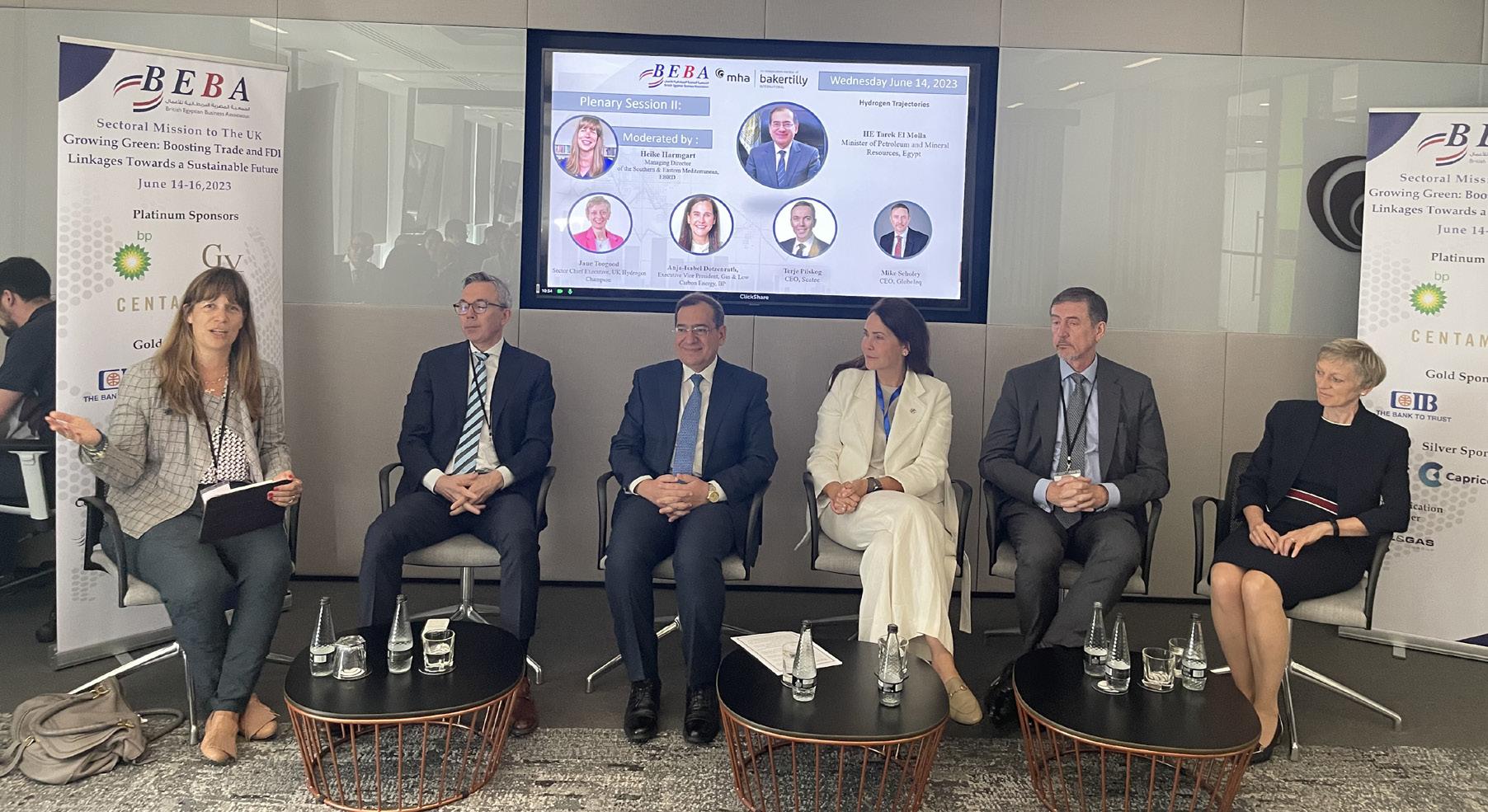
• HE Tarek El Molla, Minister of Petroleum and Mineral Resources, Egypt

• Jane Toogood, Sector Chief Executive, UK Hydrogen Champion

• Anja-Isabel Dotzenrath, Executive Vice President, Gas & Low Carbon Energy, BP
• Terje Pilskog, CEO, Scatec
• Mike Scholey, CEO, Globeleq
06 EXECUTIVE
•
SUMMARY
Wednesday June 14, 2023

Investors Roundtable Discussion
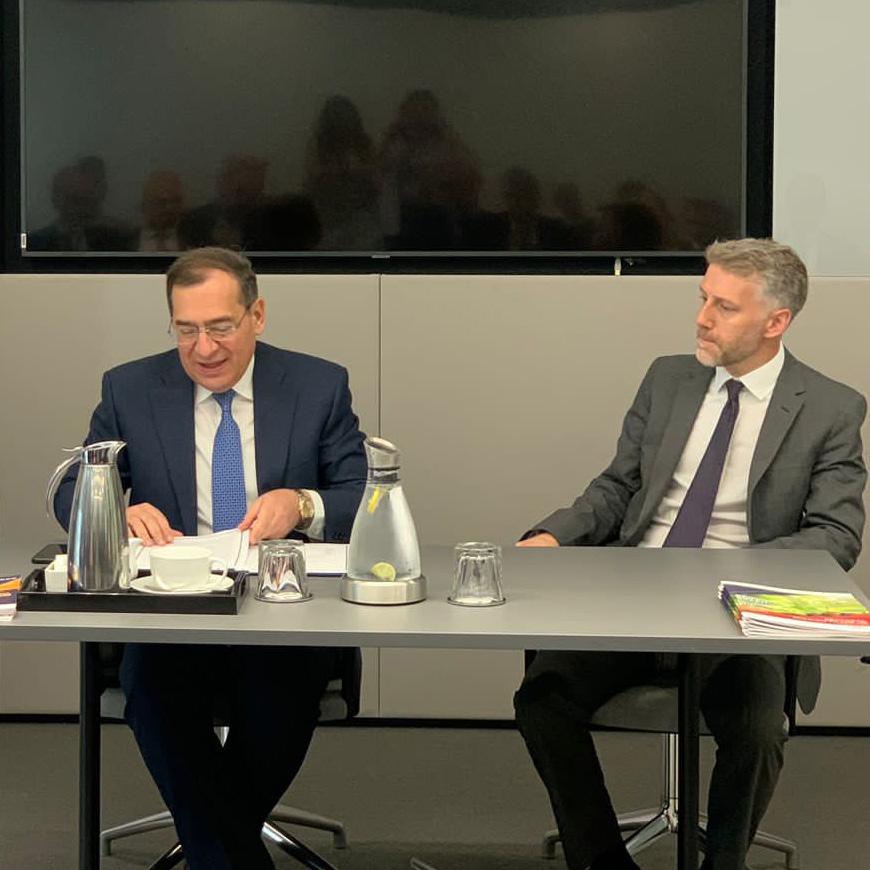

A closed roundtable in honour of HE Tarek El Molla, Minister of Petroleum and Mineral Resources was held with Energy focused companies interested in the Egyptian Market. This session was moderated by Alastair Long, HM Deputy Trade Commissioner for Africa, UK Department for Business and Trade (DBT)


•
07
EXECUTIVE SUMMARY
Wednesday June 14, 2023
Hosted by NBE UK
Networking Business Event
Hosted by the National Bank of Egypt in London, Central Bank of Egypt Deputy Governor Rami Abul Naga shared with the attendees recent updates on the macroeconomic developments and forecasts in Egypt as well as the country’s plans and efforts to navigate these challenging times.
The Egyptian Government has been grappling with the crises and challenges posed on the economy and has managed to mitigate the risks associated with the global dynamics. With the economy’s resilience and diversity and a 2% population growth, the country’s growth rate is expected to record a 4.2% growth in the current fiscal year and 6% growth rate on the medium term. Consumption has also contributed to this growth rate owned to the population demographics, which was foreseen during COVID-19 when the Egyptian economy didn’t contract then and continued to grow. Exports have also recovered notably reaching around USD 6.5 mn in nonoil exports during the past 3 quarters in the current fiscal year, with imports standing at around USD 87 million by May 2023.
To address its core mandate on inflation, the CBE has been running a monitoring stance, moving the interest rates by 1000 basis points during its Monetary Policy Committee meetings, a level that is thought to achieve the CBE’s set inflation targets. In addition, the CBE has also worked on tightening the reserved required ratios at 18% in order to ensure liquidity within the system, besides preserving financial stability by continuing to observe prudence in bank’s practices as well as considering external buffers to absorb external shocks and building
international reserves at a safe threshold where they stand at around USD 34.7 billion in May 2023.
In spite of the Egyptian Pound losing its value, the CBE Deputy Governor highlighted that the Government is not concerned with the currency moving to any direction as long as the liquidity is secured; an action that further shows how the Government is working on moving away from the currency being a nominal anchor rather than being a foreign exchange rate. On a separate note, urban inflation was noted to record around 33% in May 2023, but the Central Bank of Egypt (CBE) is working on lowering prices to manageable levels that do not compromise the consumer’s purchasing power. Additionally, the Government has also undertaken some measures to consolidate and improve the fiscal dynamics including revising tobacco prices and subsided food prices. Deputy Governor Rami Abul Naga stressed that the Government is cautious of the adopted measures and would rather not run into an easing cycle that might lead to a volatility in the decision-making process, despite how expectations for inflation rates continue to run high.
Investments in Egypt have usually contributed positively to the growth rates but are not flowing suit. Accordingly, the
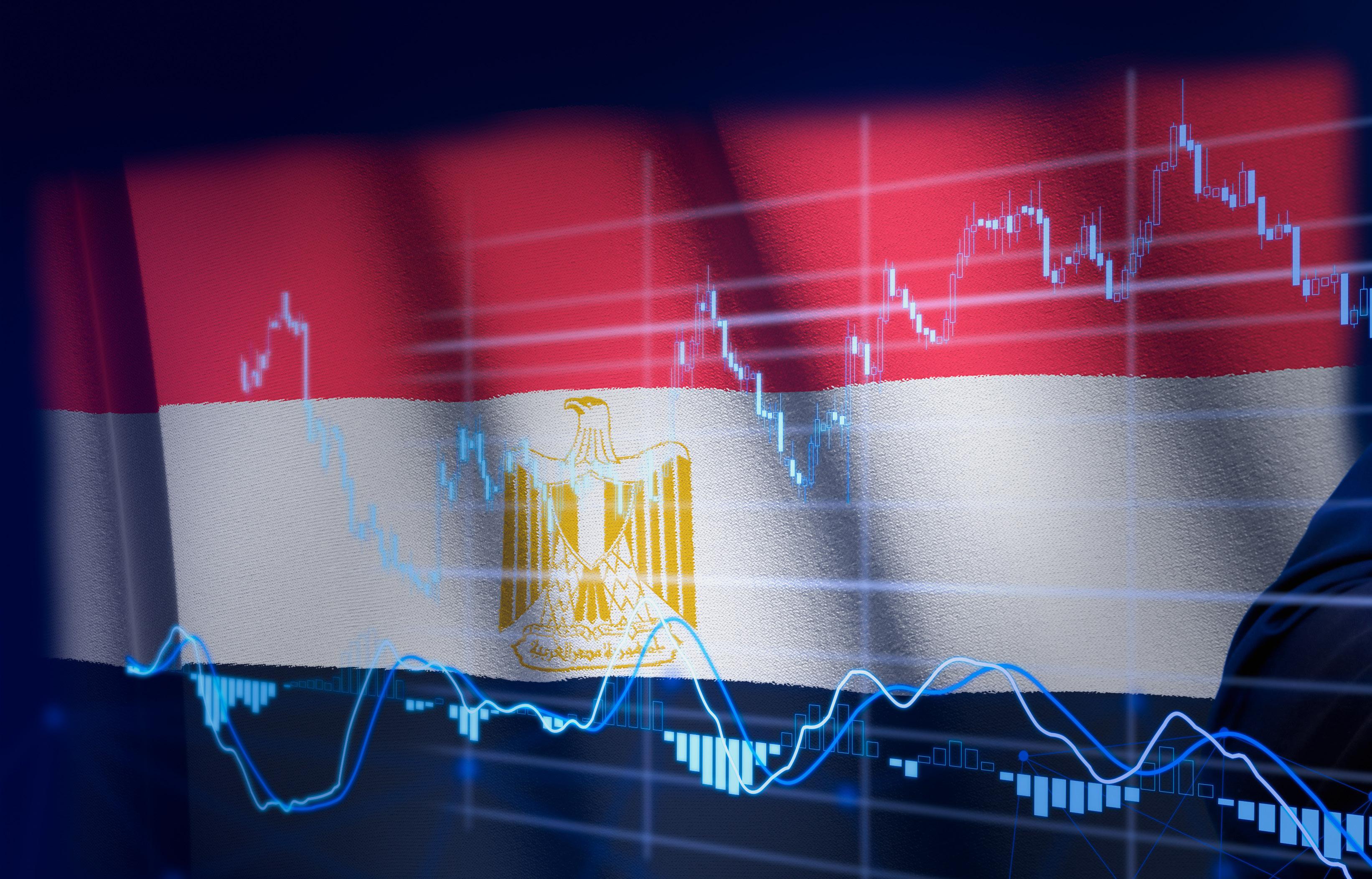

08 EXECUTIVE
•
SUMMARY
Government has been undertaking significant steps that are set to act as drivers to incentivize private investments. Deputy Governor Rami Abul Naga stressed that the challenges facing Egypt were noted to be a confidence issue rather than a current account issue, as the latter has already achieved a surplus of around USD 1.4 billion achieved during Q2 of FY 2022/23, driven mainly by the improvement in the trade balance as well as the services balance which doubled this year. Remittances on the other hand have taken a downturn, but Suez Canal receipts have recorded a USD 2.2 billion in Q3 FY 2022/23 backed by factors such
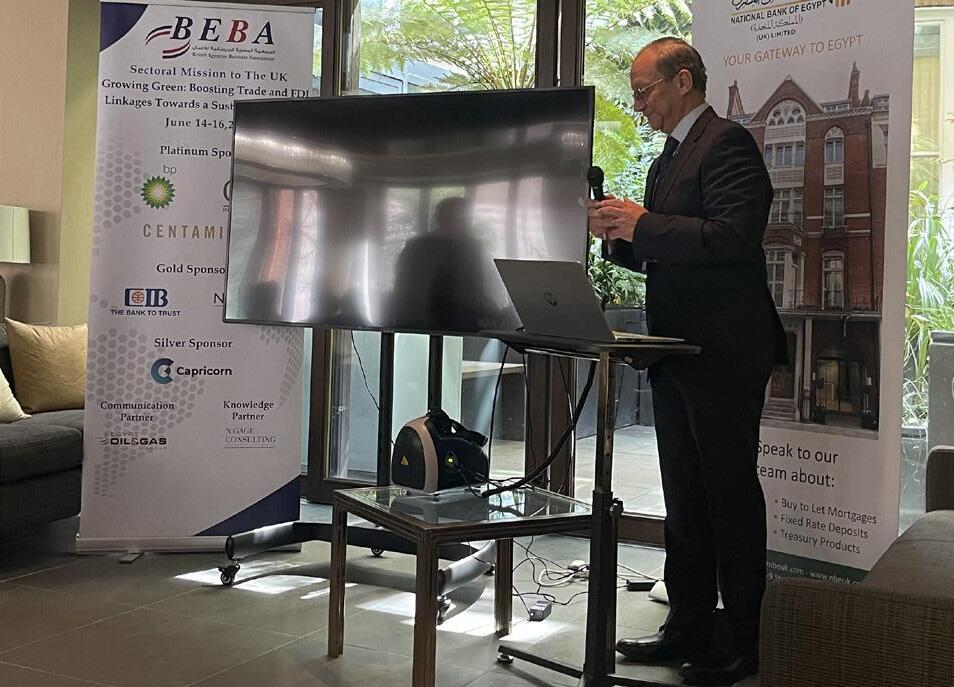
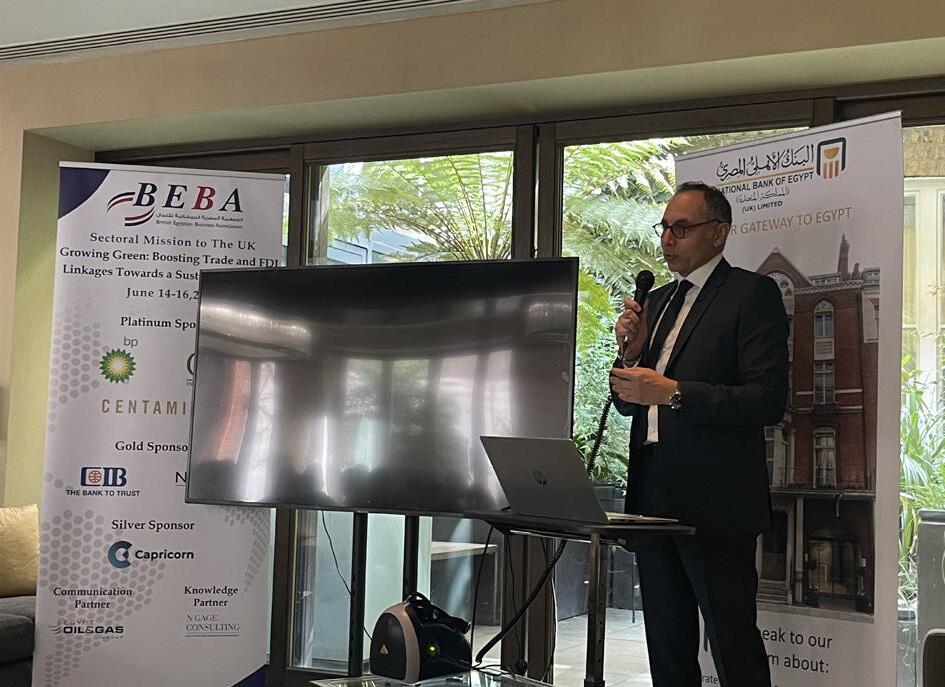
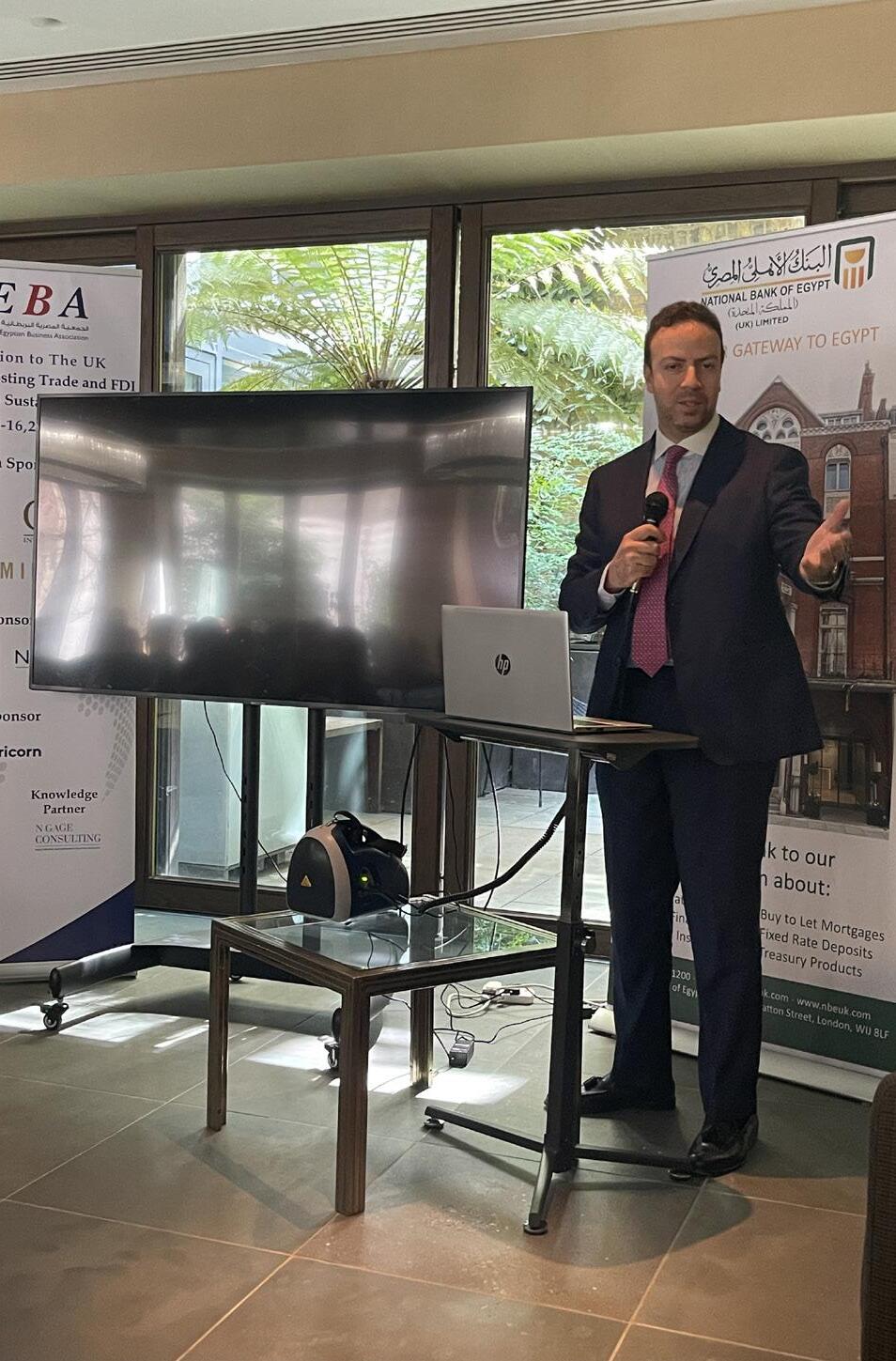
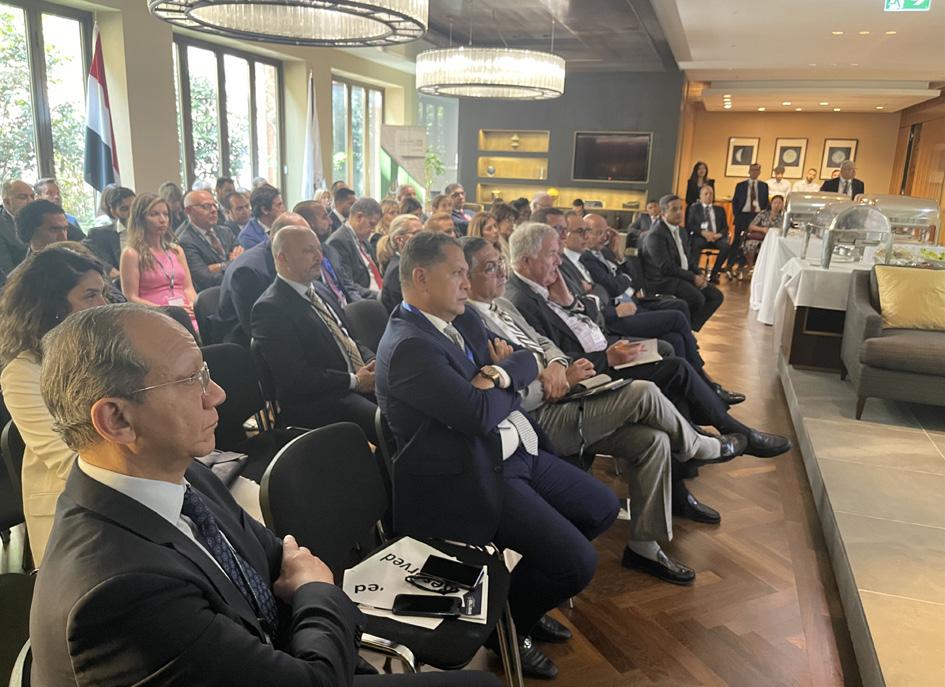

as environmental considerations. Similarly, tourism revenues plummeted post pandemic but have now recovered not only behind the undertaken marketing campaigns but also behind the strategies and plans undertaken by the Egyptian Government. Likewise, FDIs have demonstrated an improvement where around USD 9 billion were recorded in net FDIs during FY 2021/22, led mostly by the services, manufacturing, construction, and agriculture sectors. Despite the ongoing challenges, the Egyptian Government is confident that it would circumvent these crises and continue on its economic reform plans.

09 • EXECUTIVE SUMMARY
Thursday June 15, 2023

Hosted by EBRD
Financing the Egyptian

In partnership with European Bank for Reconstruction and Development EBRD, a session entitled “Financing the Egyptian Green Economy” was held on the second day of the sectoral mission, where some welcome remarks were introduced by Harry Boyd-Carpenter, Managing Director, Climate Strategy & Delivery European Bank for Reconstruction & Development (EBRD); Maged Ezzeldeen, Country Senior Partner & Deals Leader at PWC and BEBA’s board member; and HE Sherif Kamel, Egypt’s Ambassador to the UK.
The session also featured an opening video statement from Minister of Finance Mohamed Maait, who affirmed that Britain is a major strategic partner for Egypt and a leading foreign investor in the Egyptian market. The Minister further elaborated that the current global challenges have severely affected sustainable development globally, adding that joint global efforts are needed to overcome such challenges. With developing countries bearing huge burdens as a result of the repercussions of the ongoing global economic crisis and the “imported inflation” ravaging the country’s financial capabilities, the Minister highlighted that support is crucial to help emerging economies grow green. The Minister highlighted that investing in green projects provides new and promising opportunities, adding that Egypt working on offering several incentive packages to encourage environmentally sustainable projects and behind the country’s commitment to continue its economic reform process via increasing the private sector’s contributions to environmentally friendly investments, so that it becomes the main engine of growth in line with “Egypt’s National Strategy for Climate Change 2050”.
The Minister’s statement was followed by a panel session, where the discussion was led by Rami Aboul Naga, Deputy Governor, Central Bank of Egypt; Sherif Hamouda, Chairman, GV Investment Group Egypt; Hisham Ezz Al-Arab, Chairman, CIB; Heike Harmgart, EBRD Managing Director, Southern & Eastern Mediterranean; Maya Hennerkes, EBRD Director, Green Financial Systems, CSD – Green Financial Systems; and Theresa Löber, Head of Climate Hub at Bank of England. Moderated by Director of EBRD’s Climate Strategy & Regional Delivery Dimitri G., the discussion delved into the role of the government and the private sector in mobilizing
funds to achieve the country’s sustainable development goals and leveraging public-private partnerships and innovative financing mechanisms to mobilize funds for green investments.



During the panel session, EBRD Managing Director Heike Harmgart lauded the NWFE program which aims to promote eco-friendly projects in line with Egypt’s National Climate Change Strategy 2050, and to enhance Egypt’s Vision 2030. Being Egypt’s leading partner on the NWFE, EBRD is set to provide €1.3 billion to finance projects that aid the transition to green and renewable energy in the coming five years. The discussions also highlighted that while Africa is among the most affected regions by climate change, climate financing is still not enough with most of the governments not fulfilling their climate financing pledges. The session also delved into discussing where the climate financing challenges are demand driven or supply driven; accordingly, the panelists highlighted that the problem exists in carbon pricing, the available fiscal space and the evolving exchange rates, besides the difficulty in scaling up projects and de-risking them, the lack of information availability, and the existence of the right risk return.
On another front, the banking sector has been taking serious steps showing its commitment to sustainability, amongst which was CIB’s action towards joining in 2019 the United Nations Environment Program Finance Initiative (UNEP FI) Principles for Responsible Banking, principles targeted specifically for the banking sector to encompass social, environmental, and governance practices as part of their day-to-day operations. Since signing the principles, CIB has taken the lead in Egypt in forming international
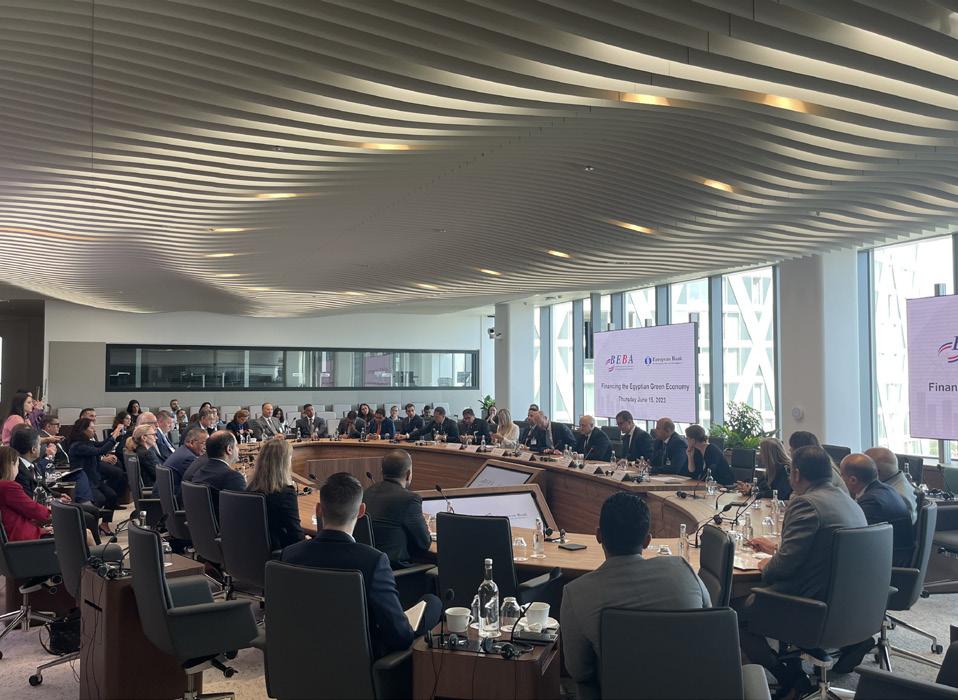
10 EXECUTIVE SUMMARY •
partnerships that address responsible banking, the empowerment of small businesses, financial literacy, and corporate commitment to climate action, in addition to being the first bank in Egypt to issue a Green Bond with a value of USD 100 million. With climate change causing not only economic but also financial risks through increased default risk of loan portfolios or lower values of assets, it becomes necessary for Central banks and financial regulators to increasingly acknowledge the financial stability implications of climate change and to work together in providing financing and trainings that enhance their abilities on integrating climate-related risks into supervision and financial stability monitoring.
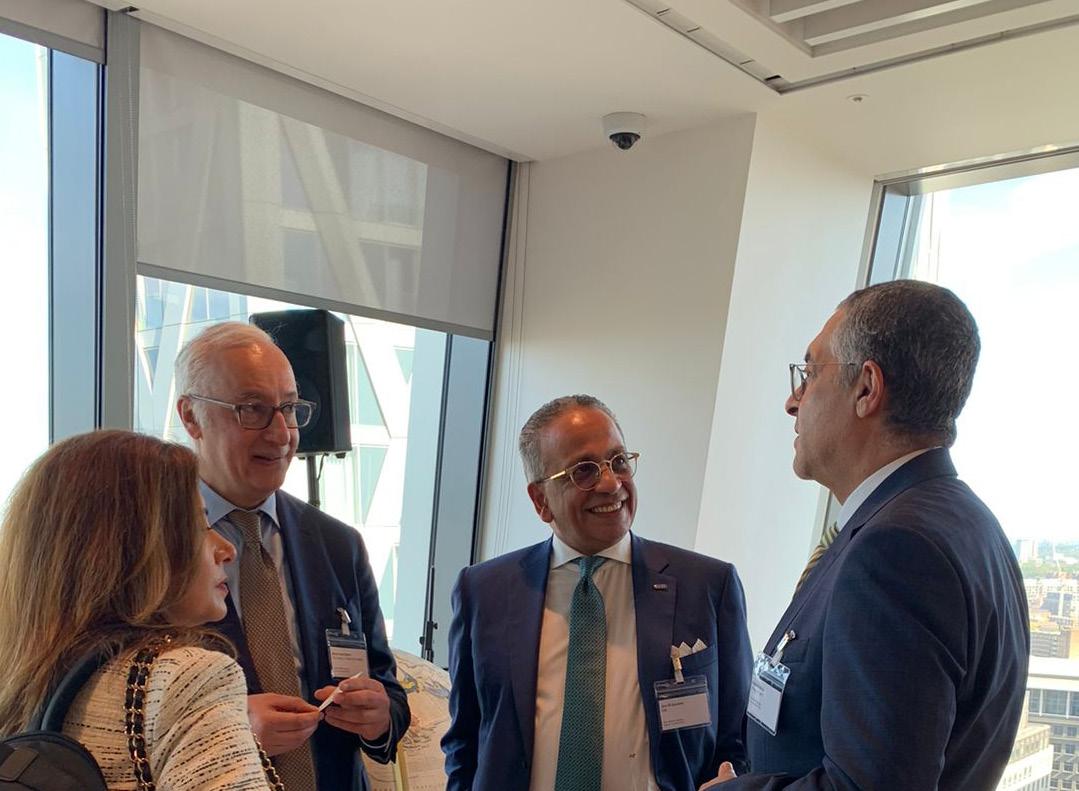




Furthermore, the panel session alluded to ‘Tarboul Industrial City’, which is considered as a model for a green industrial city that relies on the use of solar energy and wind energy to reduce reliance on traditional energy sources besides recycling water, which contributes to reducing harmful emissions to the environment and helps in the optimal investment of natural resources. Chairman of GV Investment Group Sherif Hamouda revealed that the first electrolyzer factory will be announced soon in Tarboul. Finally, the panel session concluded that more efforts are needed to address climate driven challenges and that governments could mobilize funding through publicprivate partnerships (PPPs) and blended financing.




• EXECUTIVE SUMMARY 11
Thursday June 15, 2023
Hosted by Centamin
Mining Roundtable Discussion
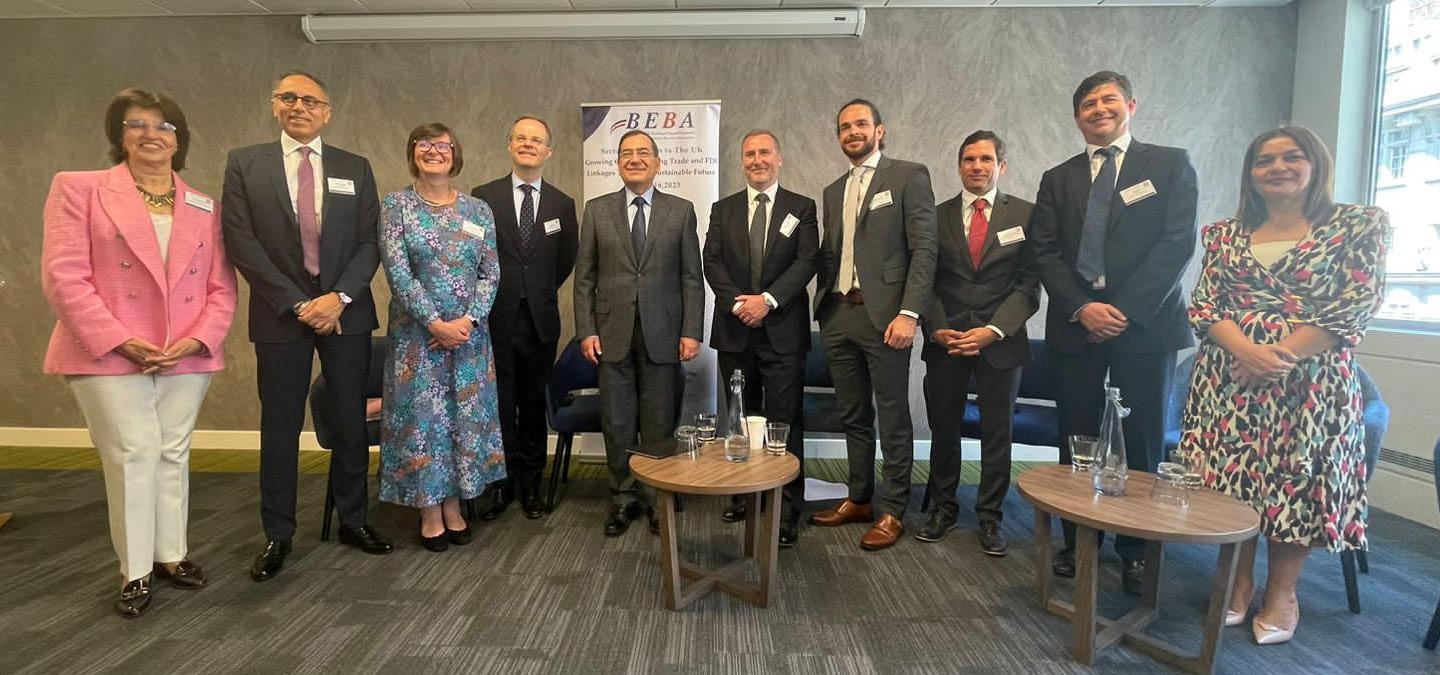
Entitled “Mining & Exploring the Egyptian Nubian Shield”, this roundtable discussion shed light on the latest achievements of the mining sector in Egypt besides discussing the enablers to accelerate the sector’s development and the potential opportunities presented for collaboration with the UK side to help the country achieve its vision.
Hosted by Centamin, Minister Molla highlighted that Egypt’s strategic location and infrastructure makes it well positioned to have a prosperous mining sector, with the Ministry of Petroleum exerting some major efforts introducing better jurisdictions and launching tenders that attract companies specialized in mining. Moreover, as part of the reform, the Ministry has submitted a regulatory amendment proposal to the Parliament with the aim of transforming Egyptian Mineral Resources Authority (EMRA) to become an economic corporation rather than a public sector entity, with the President blessing such a proposal.
With the Arabian Nubian Shield being one of the top geological places that would feature mineral deposits, Egypt becomes the right place to explore for such mining potential where the right geological criteria to invest in the mining sector exists. In addition, the huge geological exposures in

the Nubian Shields makes easier to explore and accordingly does not pose a huge exploration expense provided that the right tools are available. The panelists narrowed down some challenges that face the mining sector in Egypt including the ample quantity of available gold, the existence of many small artisanal miners that mine everywhere specially with the abundance of gold deposits, the governments’ general method of trying to micromanage mining operations, the imposition of local requirements mandates whether in tools or contractors. Furthermore, the panelists listed amongst the characteristics that mining investors look for are the ongoing regime, the enforceability of arbitration regimes, the maintenance of transparency, the reduction of associated risks by securing general stability, ensuring the enforcement of the agreements, ensuring the availability of sufficient information, in addition to others.

EXECUTIVE SUMMARY • 12
The mining sector in Egypt was contributing by less than 0.5% of the GDP in 2021, given that there was only one operational gold mine, the Sukari Mine. Accordingly, the Ministry worked on introducing an organizational strategy with an international consultant in order to pinpoint the challenges facing the sector. Amongst the listed challenges were the mining regulations that were not luring in investors, thereby leading the Ministry of Petroleum and Mineral Resources to change the Mining Code from applying a production chain to the most known and successful OND tax, in addition to adjusting licensing regulations and ensuring sufficient data availability. As mining companies showed interest in the sector, the Ministry now plans to have the sector contribute by 5% of the GDP by 2030 (for all minerals besides gold). To tackle the lack of added value and how the companies could benefit, the Ministry also initiated some industrialization shifts and ensured the country’s active presence in mining forums besides conducting local workshops and launching its very own Mining Forum, with the 2nd edition of Egypt’s Mining Forum set
to be held next month. With its solid infrastructure, skilled labor, and abundant energy resources, Egypt mining potential further grows specially given that few communities live on mining lands, which ultimately acts as a privilege to the mining companies as no relocation would be needed.


Moderated by Judith Mosely, Non-Executive Director of Blackrock World Mining Trust, Eldorado Gold Corp, and Galiano Gold Inc, this session featured the following panelists:


• HE Tarek El Molla, Minister of Petroleum and Mineral Resources
• Martin Horgan, CEO, Centamin
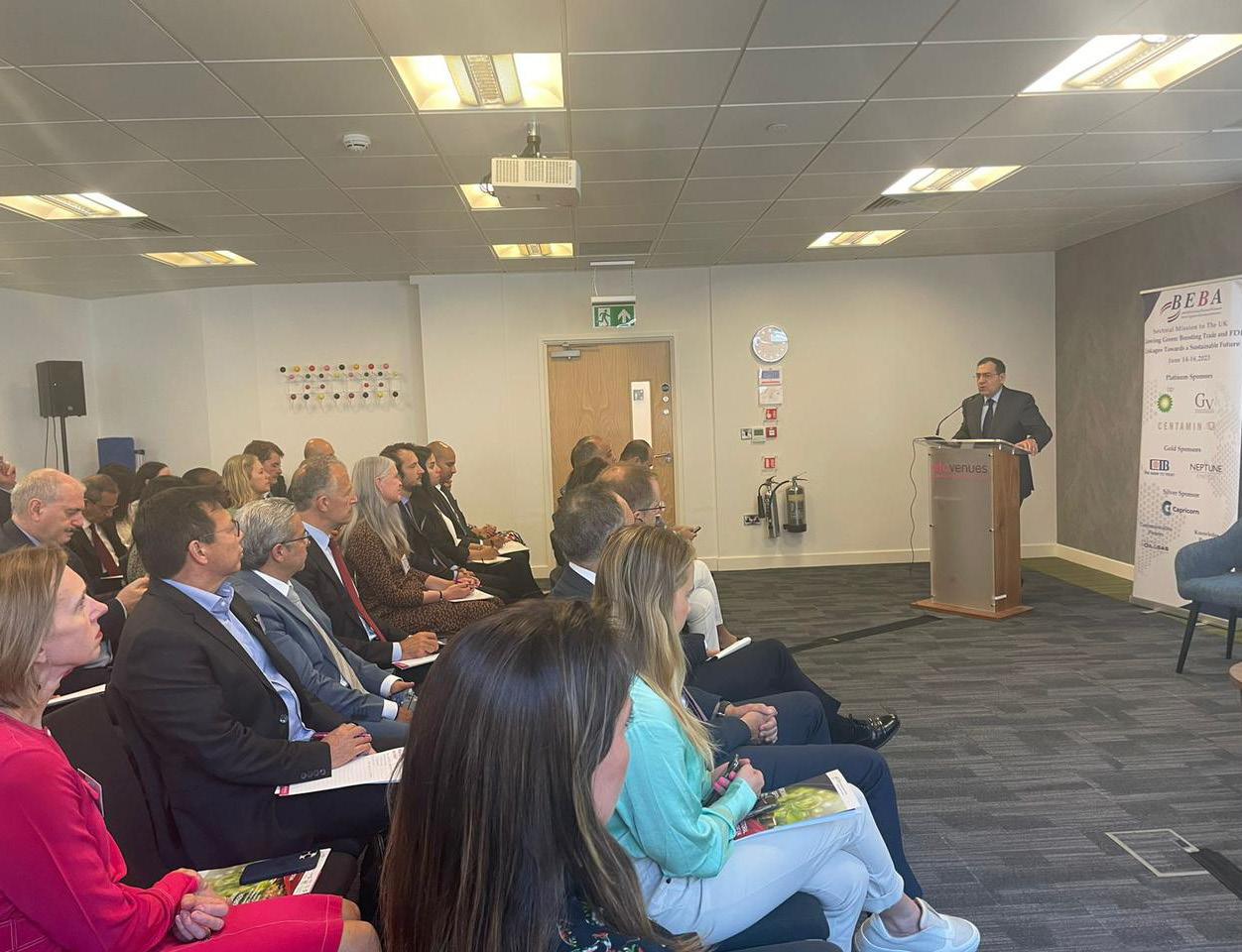
• Jon Perry, Partner, Norton Rose Fulbright,
• Patrick Barnes, Director of Metals & Mining EMEA, Wood Mackenzie
• Nathan Komarnisky, Head of Exploration in Africa & Middle East, Barrick
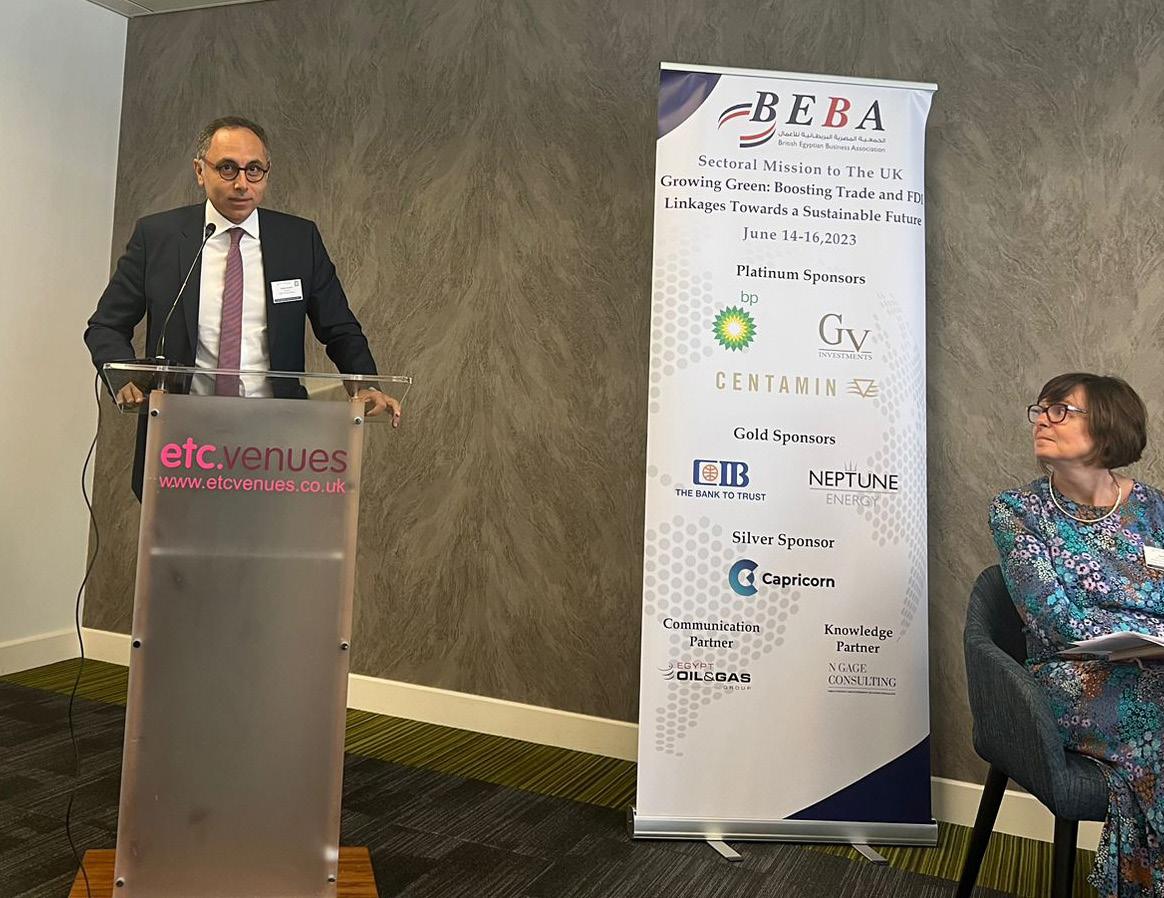
• 13 EXECUTIVE SUMMARY
Thursday June 15, 2023
Hosted by EBCC
Investors seminar

During an investor seminar hosted by the Egyptian-British Chamber of Commerce in London, President of the General Authority of Investment and Freezones (GAFI) Hossam Heiba shared his insights on the investment climate in the country, specifically with regards to the available investment opportunities and the recent efforts exerted by the Government to promote investments and industrialization including the ‘Golden License’.
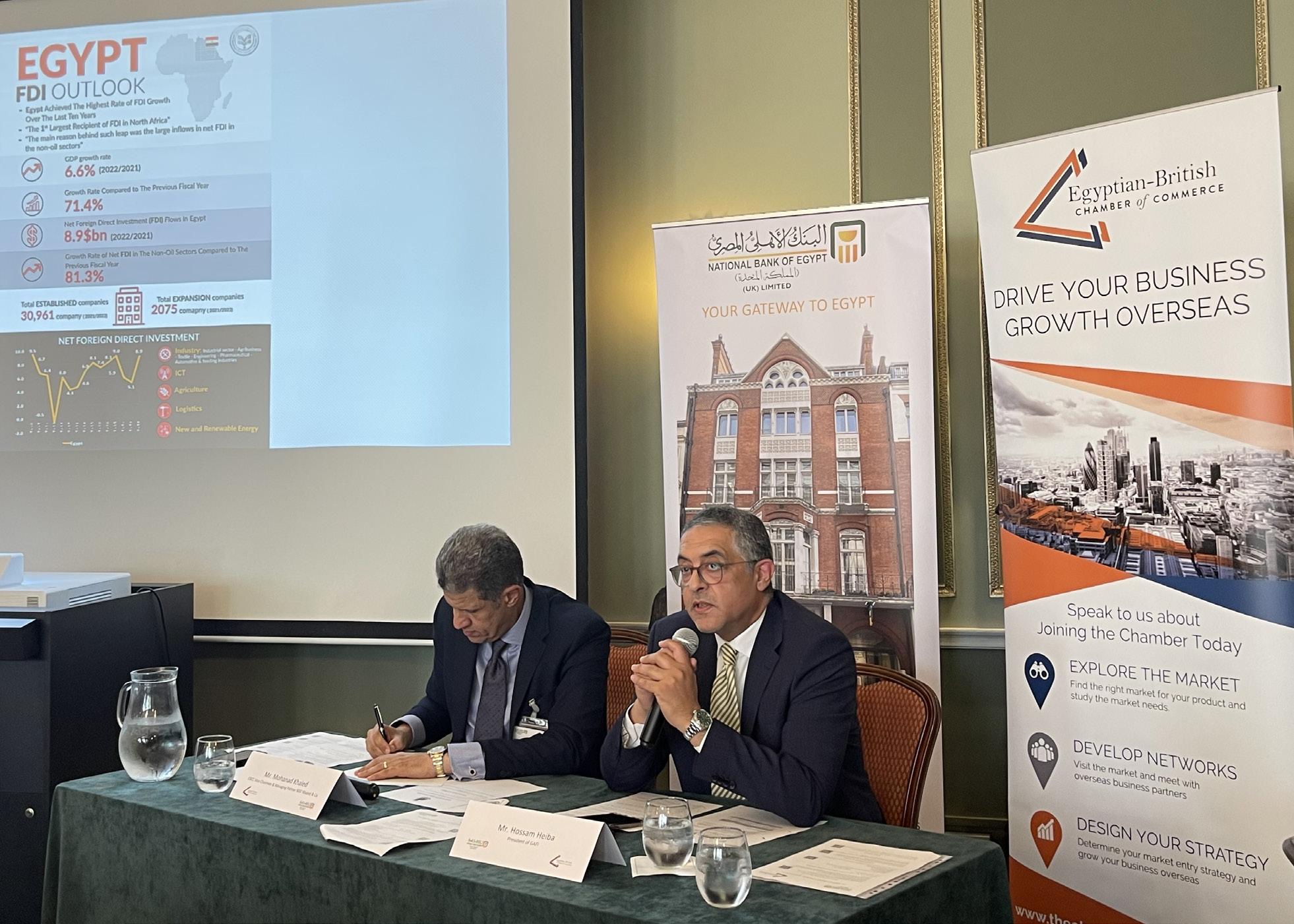


14 EXECUTIVE
SUMMARY •
In light of the Government’s vision to attract USD 10 billion as a net value of foreign direct investment (FDI) by the end of this year (up from USD 8.9 billion in 2022, the highest figure reached since 2011), the session acted as a platform for GAFI to engage with investors and providing them with a better understanding of the available investment opportunities and the potential for growth and profitability in Egypt behind its remarkable strategic location, large consumer base, availability of a skilled workforce, and the adopted investment-friendly policies.

Under its conducive reform program undertaken in 2016 with the aim of bringing stability into the country after the experienced social and political turmoil, Egypt managed to secure a stable political environment and has embarked on an infrastructure upgrade plan to attract investors, including roads and industrial cities, with 20,000 km road network being in plan by 2030, 60-70% of it having been almost reached. With respect to commercial ports, Mr. Heiba highlighted that the Mediterranean and Red Sea ports were all upgraded. In addition, the Government has managed to overturn the energy deficit experienced in 2015 by now having a surplus of around 5 gigawatts, 20% of which being generated from wind and solar energy.
With the target of attracting investments, the Government took over pushing investments into the economy given that the private
sector participation was still limited at the time during 2016, but now the Government plans for the private sector to contribute to around 65% of the GDP. The ongoing geopolitical global challenges led to a huge strain on the national economy given that Egypt imports around 70% of its basic food supplies. To mitigate such challenge, the Egyptian Government expedited its plans to farm around 2.5 million feddans, with around 600,000 feddans being accomplished in the last 5 years, which led to an increase in GDP to reach USD 480 billion, an average of 5% annual increase.
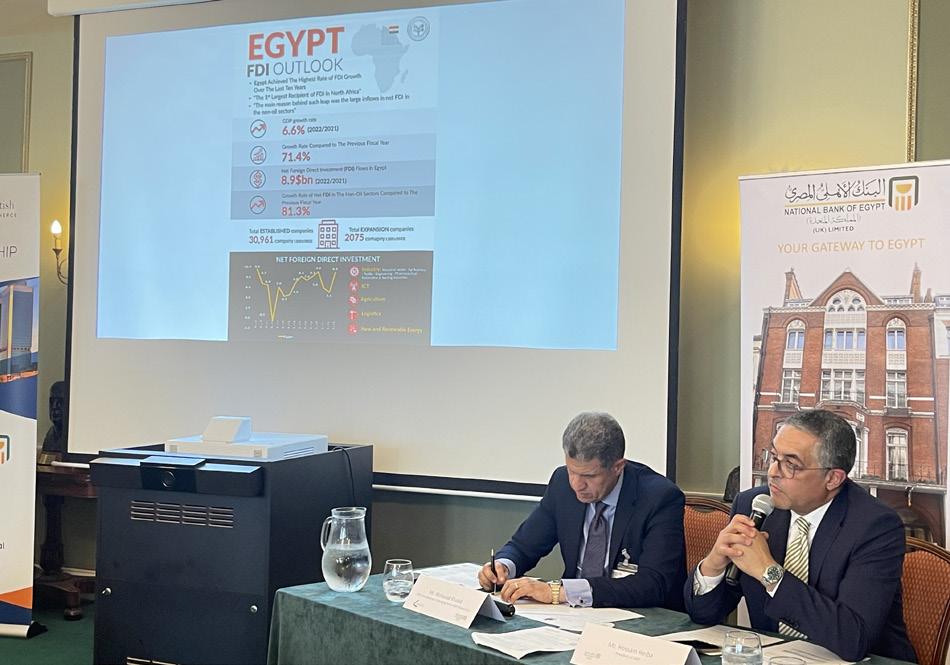
Besides that, the Government worked on luring investments into Egypt, with the FDI inflows reaching USD 22 billion, in addition to providing USD 13 billion for capital outflows. The challenges posed on the availability of the foreign currency in the national economy has led the country to work on revamping its investment strategy and policy by conducting tailor-made activities into specific locations that the country is looking to grow, such as the Suez Canal Economic Zone’s area. Mr. Heiba also highlighted that Egypt has a diversified economy with ample natural energy resources, skilled manpower, great strategic location, strong presence in the African continent at large, and numerous signed trade agreements, which makes it a favorable for investors.

To further incentivize investments, the Government has introduced various incentives including introducing tax credits, waving certain fees and taxes, enabling more than the current legislations allow for foreign workers to work specifically in green hydrogen projects, in addition to other incentives. Before end of July, GAFI is working on amending an existing law with the aim of providing offshore companies with the opportunity to operate out of Egypt with zero taxes and customs, enabling them to operate in foreign currency and under any government law the company wants to implement. Besides working on updating Egypt’s Investment Map portal such that it enables private sector companies to list their opportunities, GAFI currently holds permanent forums and dialogues with the private sector in order to attend to the needs and challenges faced by the private sector in Egypt in light of GAFI’s mandate. Accordingly. Mr. Heiba alluded that the IPO program holds tremendous investment opportunities for British investors, especially with the UK being Egypt’s top investment partner.

• EXECUTIVE SUMMARY 15
Thursday June 15, 2023

Networking Reception
On June 15, 2023, the Egyptian Ambassador to the UK, Sherif Kamel, hosted a networking reception that was attended by a diverse group of professionals from various industries including mining, oil and gas companies.


The attendees exchanged views and experiences and discussed ways to strengthen the relationship between the UK and Egypt during the reception, which also paved the way for the guests to network and establish new partnerships.
During the reception, the attendees discussed the bilateral trade
and investment opportunities between the UK and Egypt, and left with a renewed sense of enthusiasm to work together and strengthen the bonds between the two nations. The networking reception hosted by Ambassador Kamel was a significant step in promoting the UK-Egypt partnership and is expected to lead to further cooperation and collaboration in the future.
16 EXECUTIVE SUMMARY •



• EXECUTIVE SUMMARY 17
Friday June 16, 2023
Hosted by EBCC
Breakfast Briefing in honour of HE Dr. Mohamed Maait
Minister Maait affirmed the Government’s commitment to controlling public finances and achieving a sustainable economic growth that is led by the private sector. By adopting a flexible strategy that is capable of containing internal and external shocks, Egypt is set on adopting balanced policies that contribute to dealing positively with the negative repercussions imposed by the global crises witnessed across all economies through severe inflationary pressures that raised the cost of financing and increased the difficulty of accessing international financial markets. Accordingly, the Minister elaborated in his statement that the Government has taken effective, concrete steps in implementing a structural reform program to ensure fair investment opportunities and lure more foreign and domestic investments into the economy.
In his meeting with the members of the Egyptian-British Chamber of Commerce, the Minister added that Egypt is mobilizing all the means to stimulate investment and enhance domestic production and export, reflected across its sturdy infrastructure which is capable of accommodating more economic activities and creating a business climate that is more attractive to capital. The latest legislative amendments that cancelled any preferential treatment granted to state-owned companies and entities, coupled with the launching of the “State Ownership Policy Document” which aimed to increase the private sector’s contribution to the GDP, and the announced IPO program, which includes offering 32 state-owned companies on the Egyptian Stock Exchange until the first quarter of 2024 and aims to achieve USD 2 billion before the end of the current fiscal year, all show a
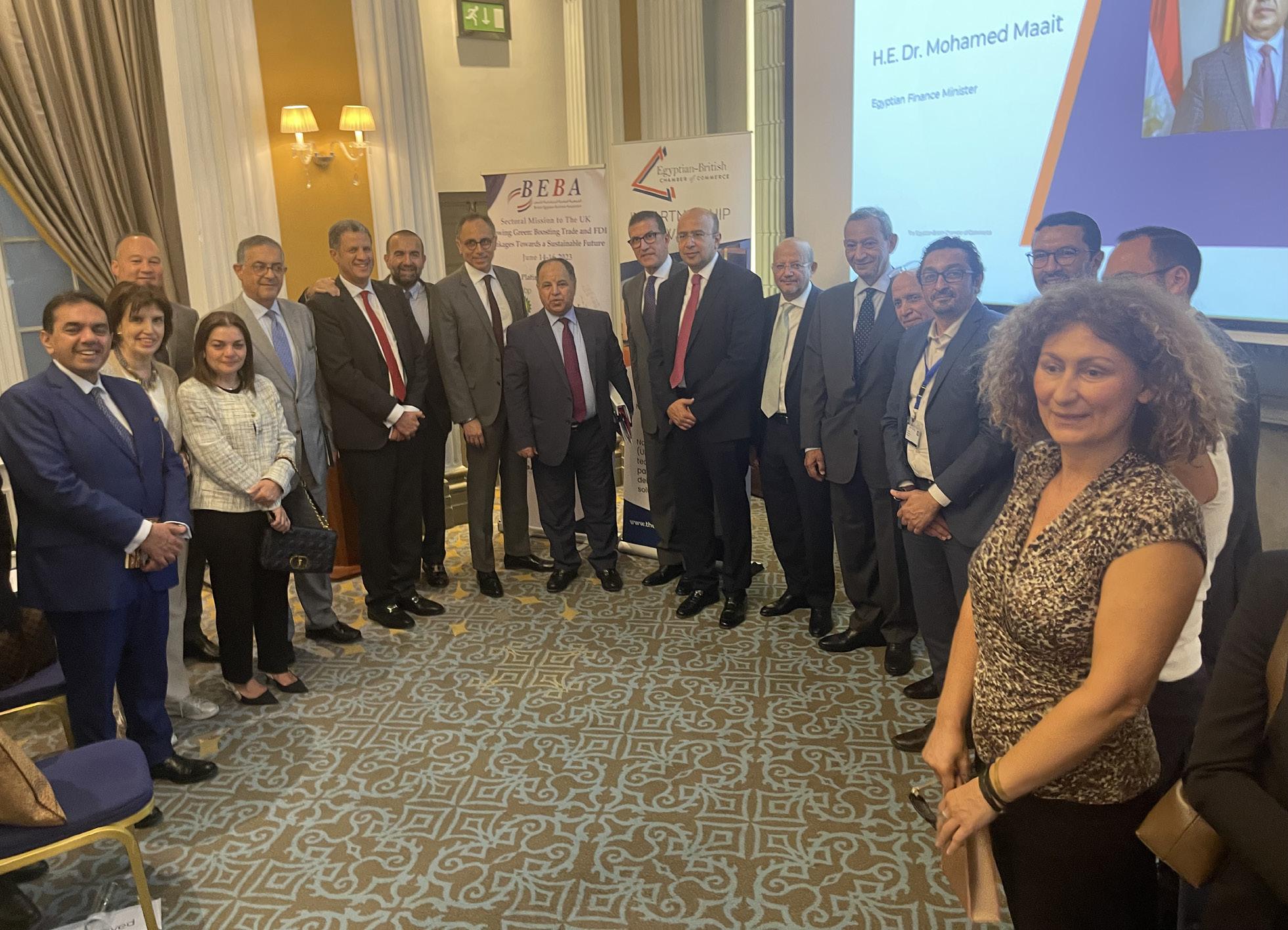

18 EXECUTIVE SUMMARY •
During a breakfast briefing hosted by the Egyptian-British Chamber of Commerce in London, Dr. Mohamed Maait, Minister of Finance, shared his views on the economic performance of the Egyptian market and the current challenges posing a threat on the domestic economy.
serious effort by the Government to offer a conducive investment climate for the private sector. In addition to the aforementioned efforts, the recently launched ‘Golden License’ aims to shorten the procedures for setting up investment projects, in a way that creates a more favorable investment environment for both production and export.
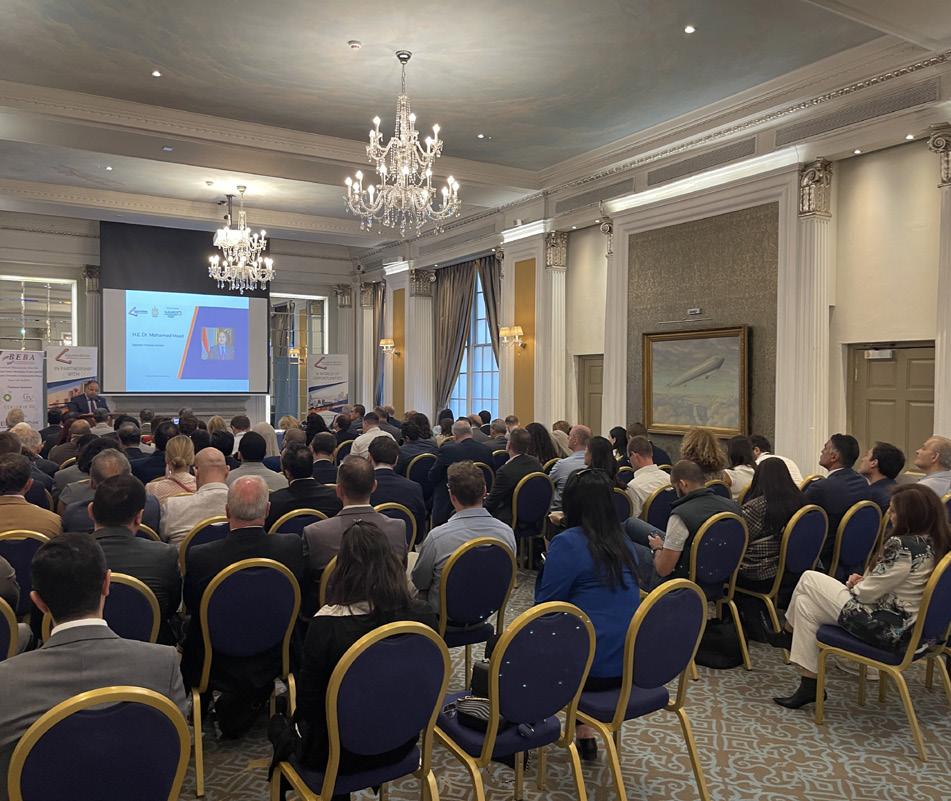
Minister Maait also highlighted that the macroeconomic indicators during the past 11 months of the current fiscal year have witnessed an improvement, with the Government achieving the following:
• a primary surplus of about 1.2% of GDP
• a tax revenue growth of 29.4% behind the undertaken digitization developments that the tax system witnessed during the past years
• a current account surplus during the first half of the current fiscal year by about USD 1.8 billion
• an oil trade balance surplus of about USD 1.9 billion an improvement in the non-oil trade balance by about USD 6.2 billion
• an improvement in tourism revenues by 26%
• a net foreign direct investment of USD 5.7 billion, with a growth rate of 75%

• an increase in the Suez Canal revenues to record USD 4 billion.
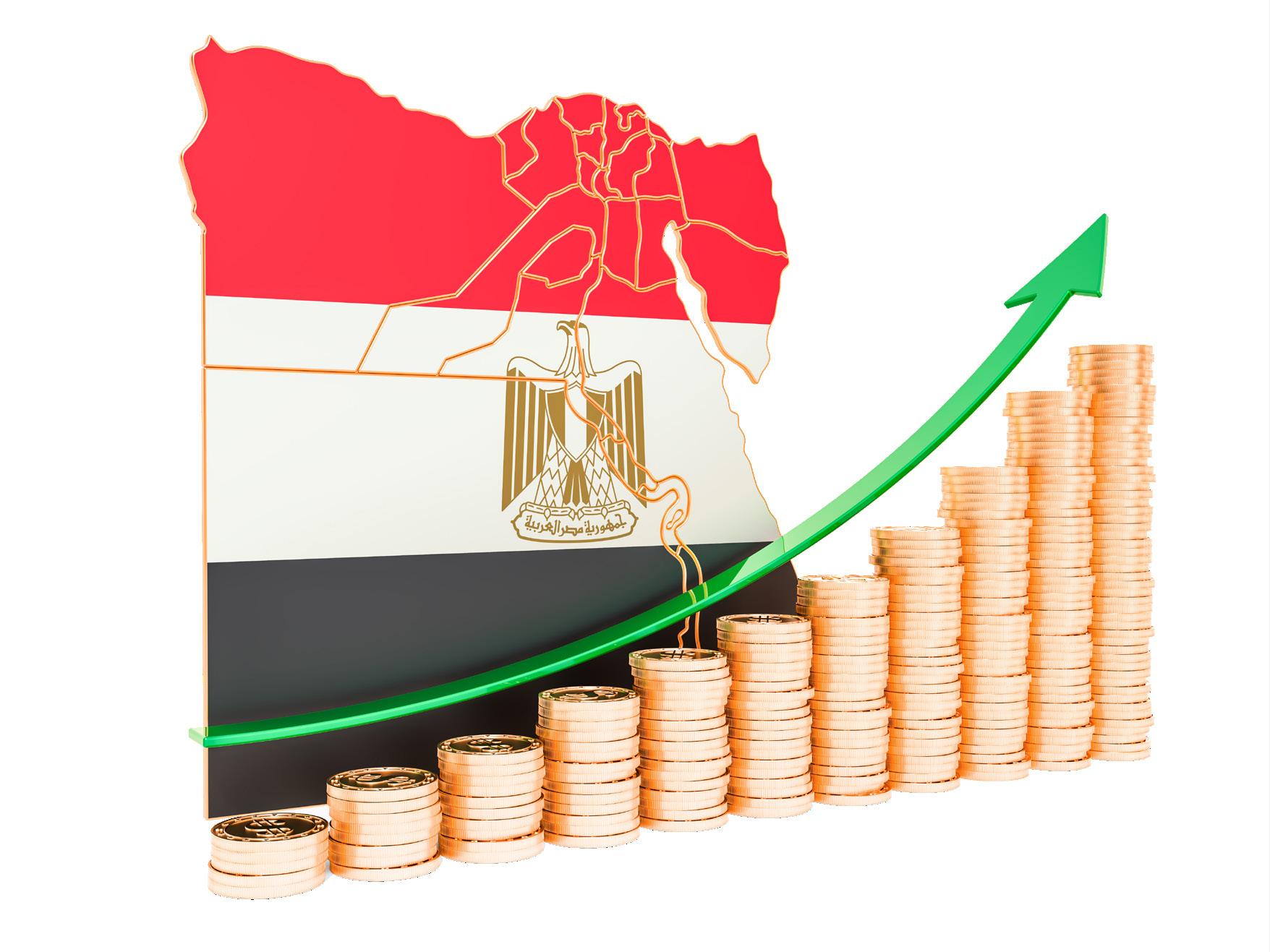
Egypt is also working on maximizing its efforts to diversify debt instruments and reduce their cost by accessing innovative financial instruments that contribute to putting the debt rate on a downward path and ensures that it reaches less than 80% of the GDP by June 2027. Under the framework of strengthening financing diversification, Minister Maait highlighted that the Government aims to extend the debt life to 3.5 years by the end of June 2023 and 5 years by June 2027, adding that FY 2023/24 general budget aims to achieve a 4.1% growth and a 2.5% primary surplus (up from the 1.5% set to be achieved by the end of FY 2022/23).
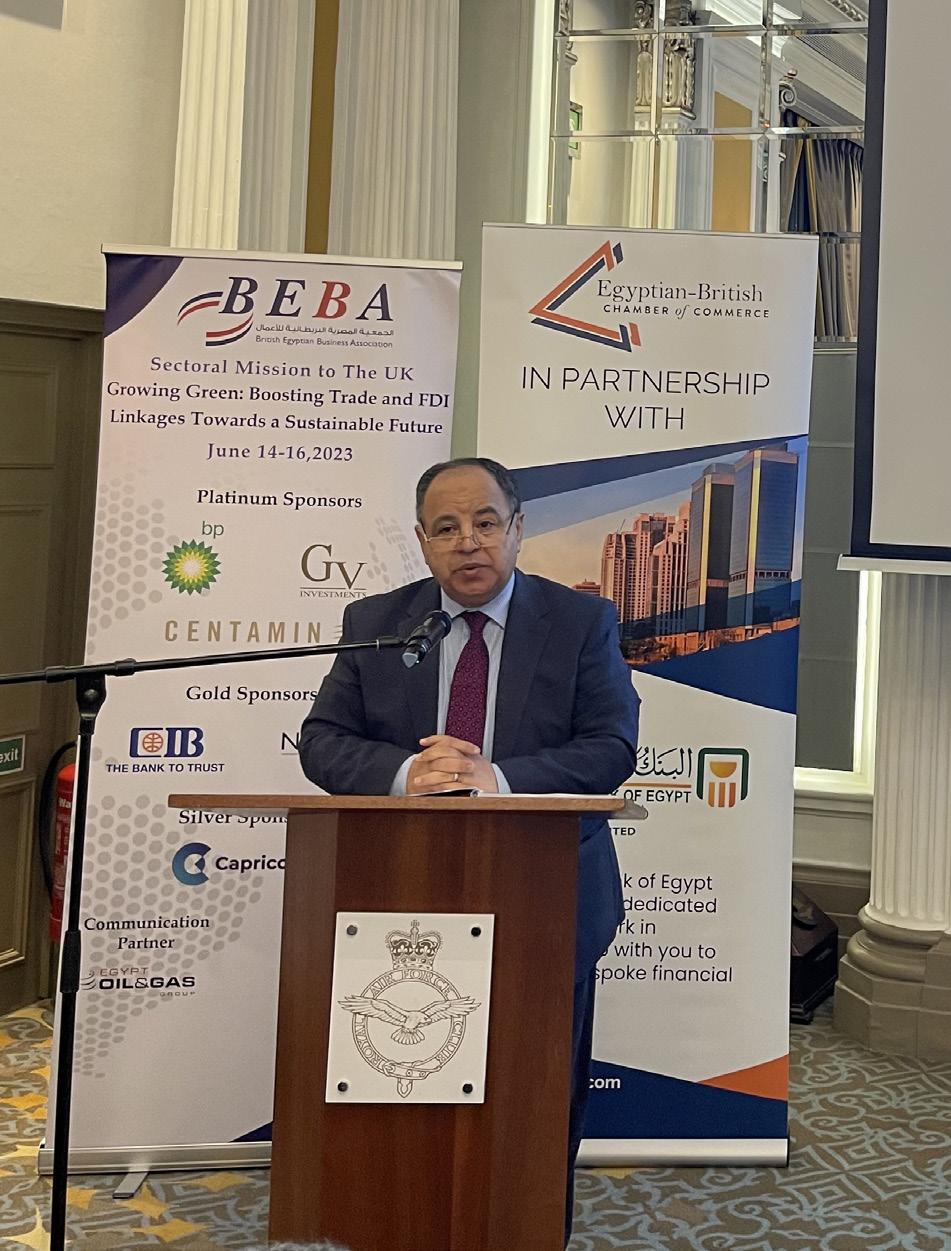
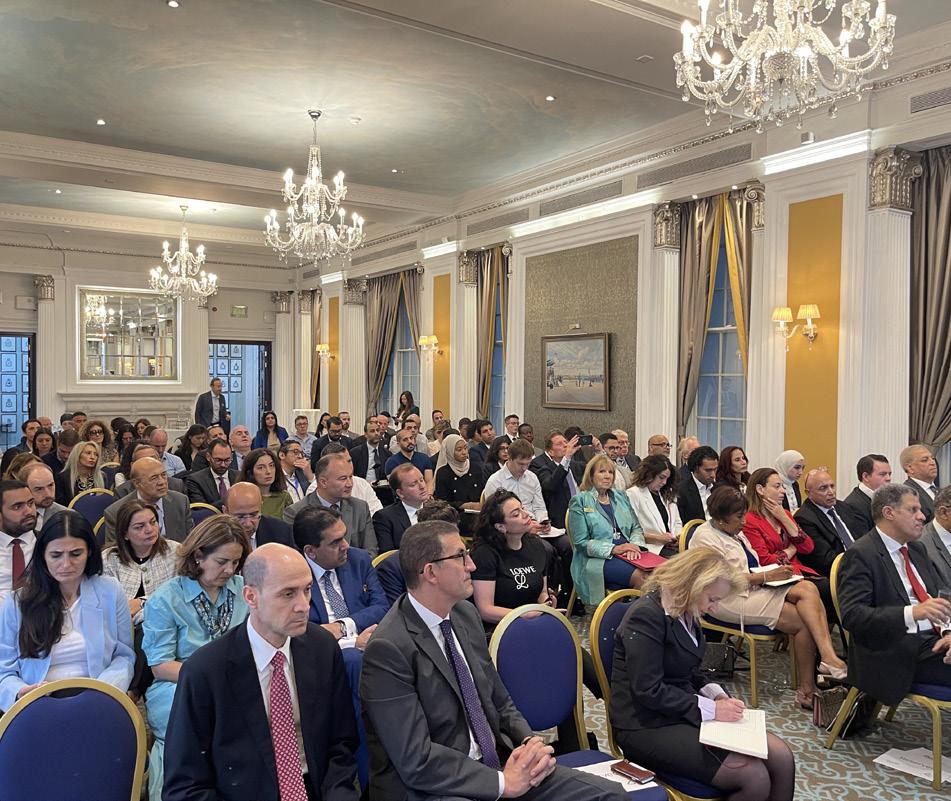
• EXECUTIVE SUMMARY 19
Friday June 16, 2023

Hosted by ABA

Networking Business Lunch

Dr. Mohamed Maait stressed that the Government is continuing its plans to implement a comprehensive package of structural reforms that aims to ensure economic stability and launch a high, sustainable growth path, that ultimately aids the country in dealing positively with the interlocking repercussions of external shocks that lead to unprecedented pressures on the country’s budgets.
Minister of Finance

20 EXECUTIVE SUMMARY •
With its diversified economy, Egypt is not only able to circumvent local and global challenges but also works on maintaining a great balance that secures a safe economic path for the country and enables it to overcome the effects of successive crises.

During a meeting with members of the “Arab Bankers Association” in London, Minister Maait further elaborated that the Egyptian economy has the ability to attract foreign inflows, adding that the measures and reforms undertaken by the Government to empower the private sector has paved the way to increasing foreign direct investment to reach USD 5.7 billion during the first half of the current fiscal year (FY 2022/23). Pointing to the significant increase in Egyptian exports and the increase in non-oil exports which witnessed a remarkable growth during the previous fiscal year, the Minister shed light on the performance of the Egyptian economy, which also witnessed the recovery of the tourism sector during the past fiscal year, in addition to a significant and sustainable increase in the revenues generated by the Suez Canal.


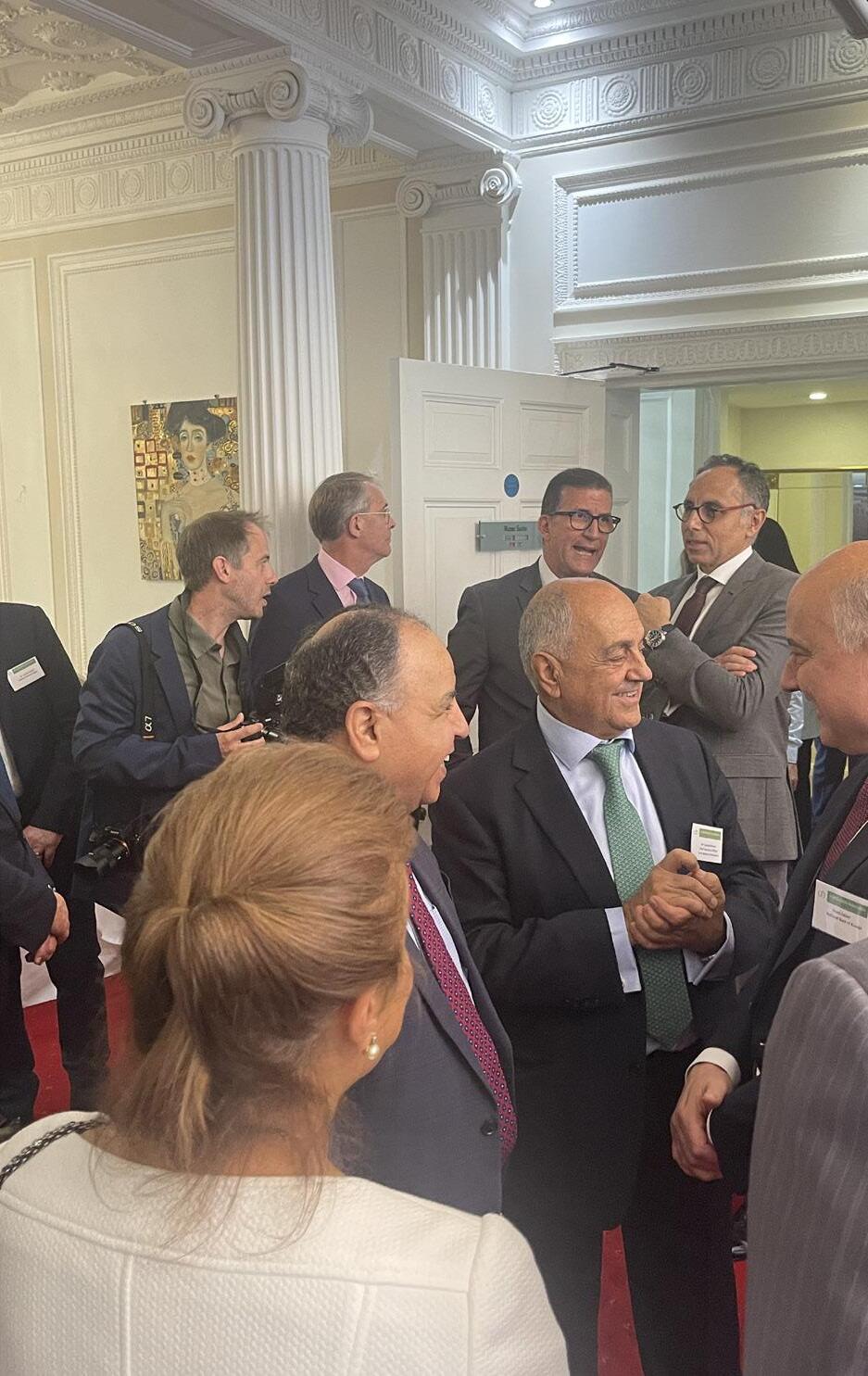
Pivotal to the local operating investment climate, the recent decisions of the Supreme Investment Council guarantee competition within the Egyptian market, behind the inclusion of a legislative amendment that entails the cancellation of tax and customs exemptions in addition to other preferential treatment for state-owned companies

and entities. The Minister highlighted during the meeting that such amendment is expected to yield further private investments, pointing out that the Government is targeting a USD 2 billion during the next period with its largest IPO program, set to instigate local and foreign investments, attract new segments of investors, and pave the way for the growth of the private sector.
Minister Maait also stressed that the Government is committed to achieving financial discipline and reducing debt rates to less than 80% by FY 2026/2027, besides reducing the average debt life to range from 4.5 to 5 years. The Government is also set on achieving a 1.5% primary surplus by the end of the current fiscal year (FY 2022/23) and 2.5% by the next fiscal year (FY 2023/24), which will ultimately aid in expanding the social safety nets, reducing the burdens on citizens, and ensuring the economy’s strong, rapid response in dealing with global challenges.
The Minister’s statement also touched on the state’s public treasury, which bears an additional EGP 12 billion behind the difference in the interest rate, and targets providing EGP 160 billion in credit facilities to support the agricultural and industrial production and boost the tourism sector. During FY 2021/22, the Government reached a primary surplus of 1.3% of GDP and reduced the total deficit to 6.1% of the GDP, with the debt-to-GDP ratio reaching 80.7%.
21 • EXECUTIVE SUMMARY
Impressions on BEBA Mission
Mark Jonathan Davis, Chief Executive Officer, Capterio
“It’s inspiring to see the leadership of His Excellency Tarek El Molla on energy issues in Egypt. Egypt is not only a regional oil and gas super-power, but it is blessed with great opportunities in wind and solar (and more)and it’s right on Europe’s doorstep. Egypt has a sharp focus on decarbonisation and hydrogen is also good business - plus there are many exciting investment opportunities too. Thanks to British Egyptian Business Association (BEBA) and Rishi Sunak’s government, the UK’s partnership goes from strength to strength”
Nader Zaki, Regional President, Middle East and North Africa, BP
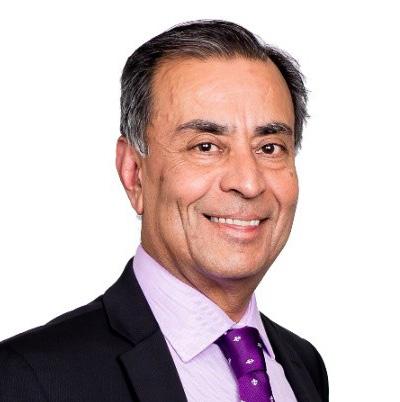
“The BEBA business mission to the UK provided a unique platform, bringing the Minister of Petroleum and Mineral Resources accompanied by key government officials and energy players to openly discuss the green energy industry’s opportunities and challenges, while strategically advancing Egypt’s energy transition agenda. Thanks to the organization efforts of the BEBA team, the mission facilitated valuable networking opportunities, bilateral meetings, and laid the foundation for impactful collaborations among all participants.”
Eleanor Rowley, Managing Director, Capricorn Energy PLC

Capricorn was delighted to sponsor the BEBA Sectoral Mission to the UK. BEBA had gathered a diverse group of stakeholders across public and private Egyptian and UK entities, allowing a rich conversation on decarbonisation opportunities, green financing and more

Rene Leven, Segment Leader, Hydrogen & CCUS, New Energy Solutions

My colleague Samuel Suchel and I were impressed by the profound and realistic strategy being implemented in Egypt backed by their strong set up of existing infrastructure, talented workforce and a huge domestic market of more than 110 mio.”
“Big thanks also to team BEBA, the UK trade mission and all our wonderful industry peers and partners who we could meet during the event. Great discussions, intent and ambition. Good mix to drive things forward and of course many follow up actions for everyone to keep the momentum!”
George Kanan, CEO, Arab Bankers Association (ABA)



It was truly rewarding to be able to support BEBA mission to London and to have HE Dr. Mohamed Maait as our guest of honor at our lunch on its last day. He was a splendid guest and his presence was greatly appreciated by our membership”
Rakesh Shaunak, Chairman, MHA
MHA was delighted to welcome the British Egyptian Business Association (BEBA) to our London office today and host them as they delivered their seminar on “Growing Green: Boosting Trade and FDI Linkages Towards a Sustainable Future Discussions were focussed on current and future decarbonisation efforts of Egypt’s oil and gas sector, and exploring the potential opportunities for learning and collaboration with the UK. We are honoured to have several esteemed guests and speakers who offered their thoughts and expertise on these matters.”
22 EXECUTIVE SUMMARY •
N GAGE CONSULTING
This report was drafted by N Gage Consulting, the Knowledge Partner of the BEBA Sectoral Mission to the UK
N Gage Consulting is a leading regional Public Policy and Government Affairs firm established in 2013. N Gage Consulting offers a variety of services that are typically tailored to suit each client’s needs and accordingly range from offering public strategy advice, assisting with government affairs, supporting on regulatory affairs and regulatory due diligence, aiding in factory registration and export subsidy reclamation, engaging in proactive, reactive planning all the way to mobilizing its connections to lobby for its clients’ business issues; addressing and overcoming their respective government related challenges and optimizing their business performances. Having more than 150 clients across 20 different sectors with a very solid client retention rate, N Gage Consulting has been able to deploy and expand the diversity of its services within the space of public policy and government affairs, especially with its vast geographical presence with 4 offices in Cairo, Casablanca, Dubai, and Riyadh.
23 • EXECUTIVE SUMMARY
For more information: https://thengagegroup.com Email: info@ngage-consulting.com Address: 2 Hassan Sabry Street, 2nd Floor, Zamalek, Cairo, Egypt Phone: +202 27374764
HONORING THE PAST BY PRESERVING THE FUTURE!
SCAN THIS CODE


EXECUTIVE SUMMARY •


• EXECUTIVE SUMMARY













































































































